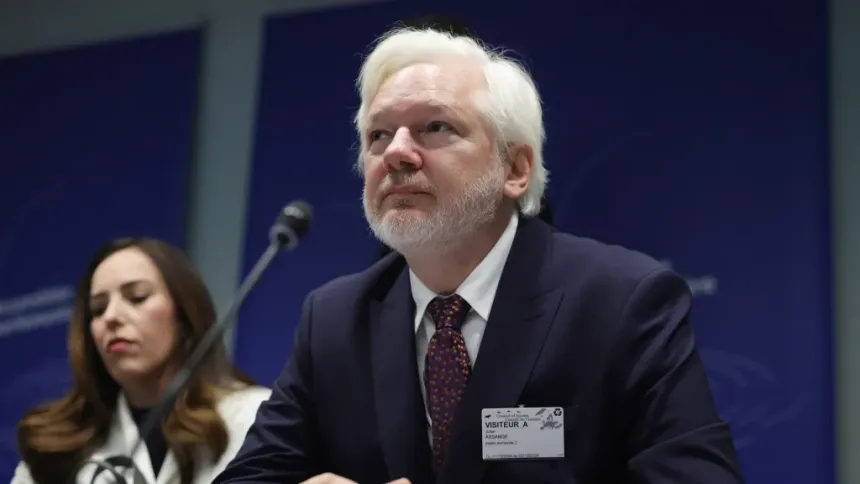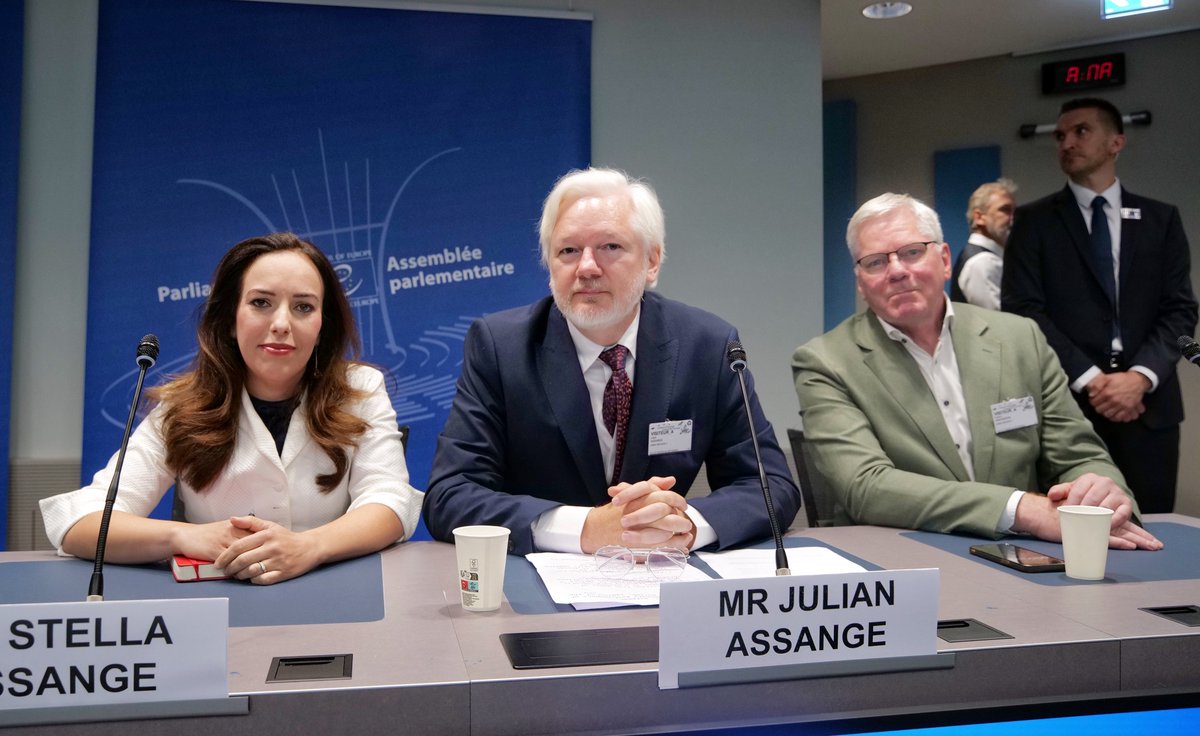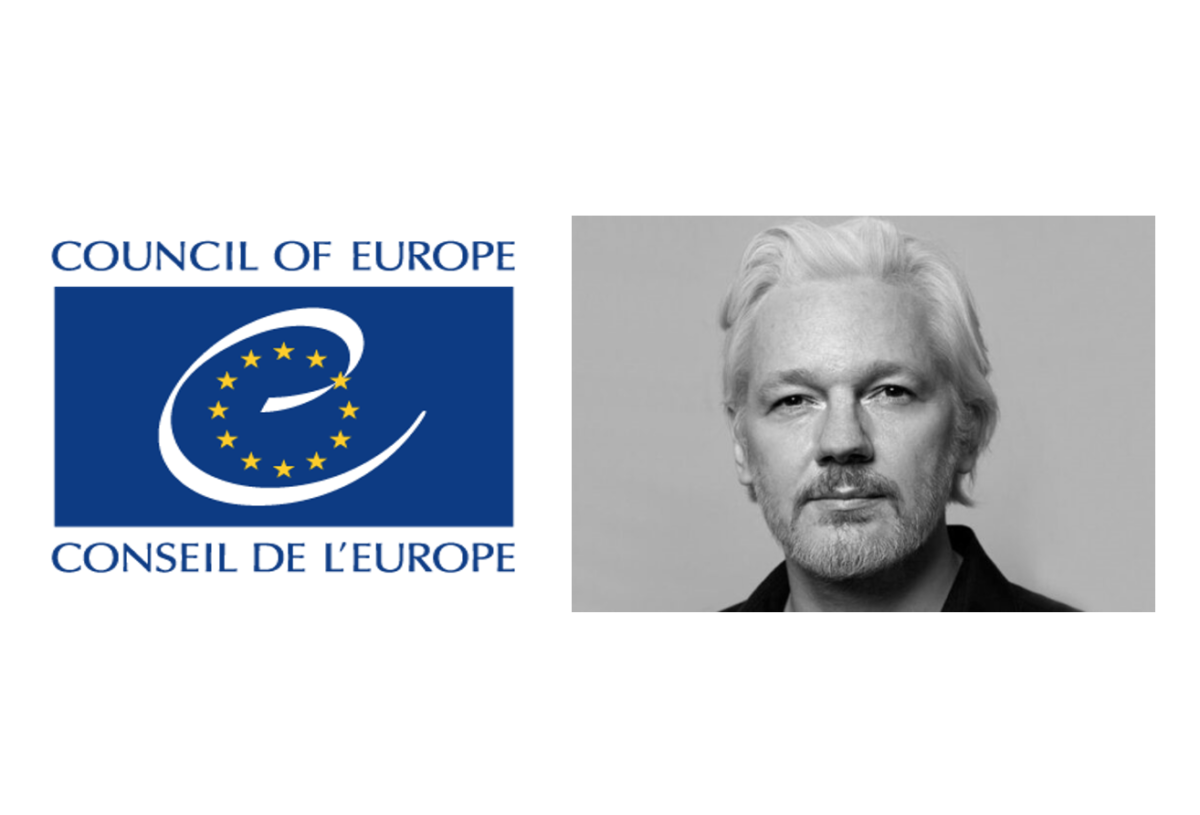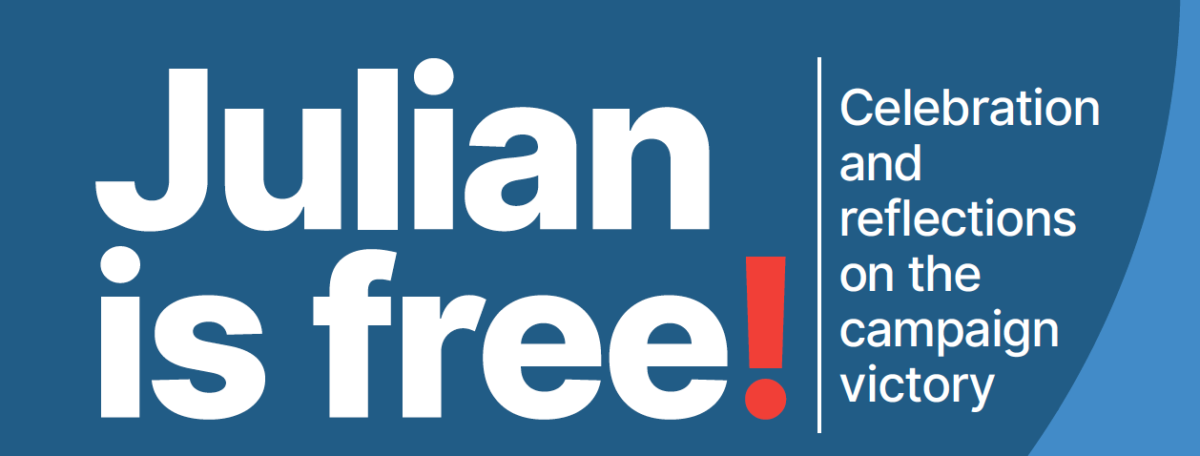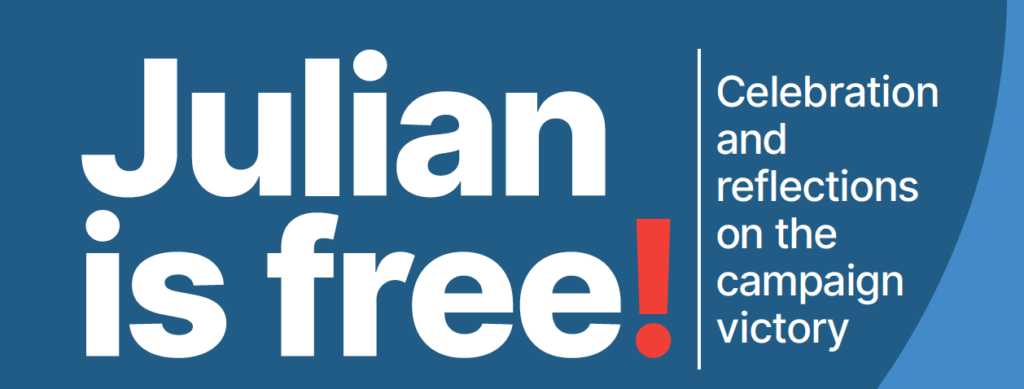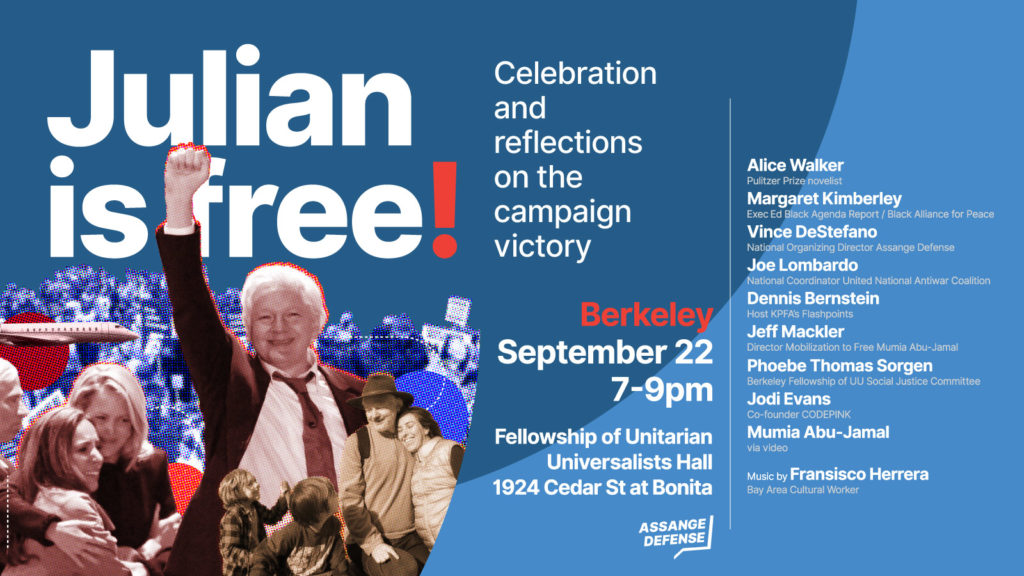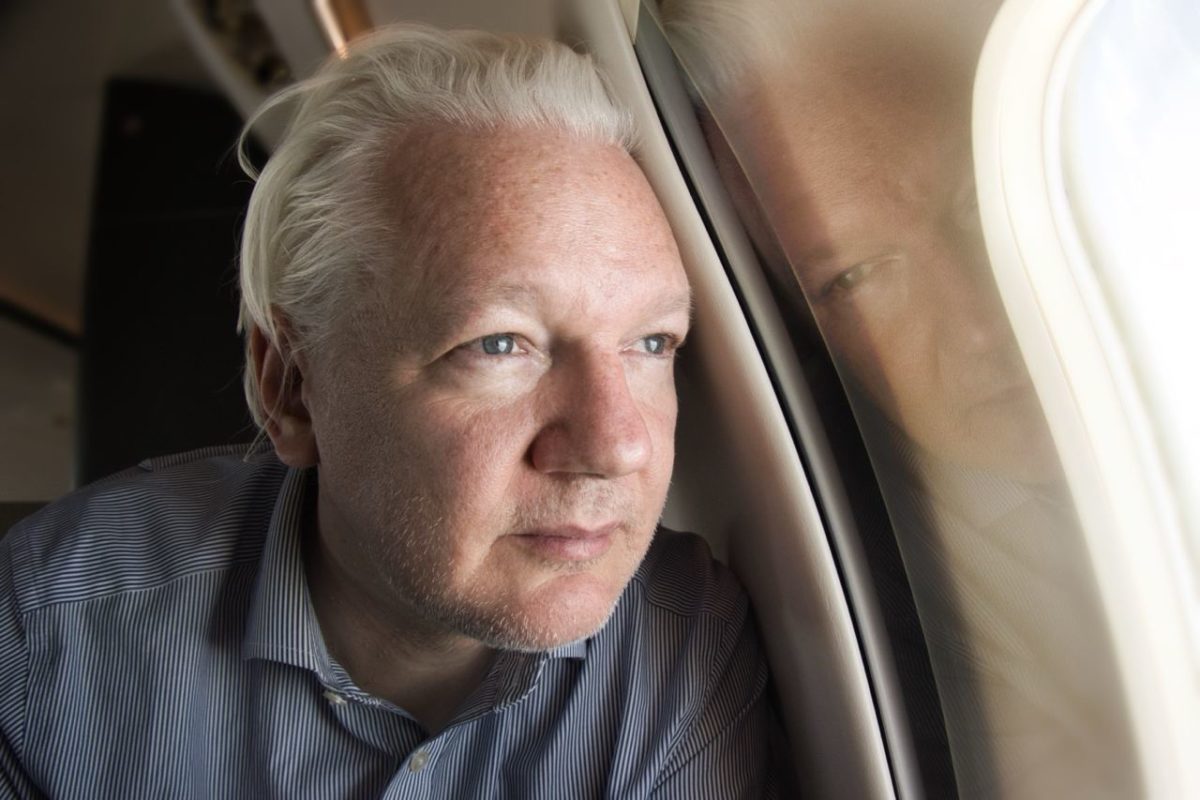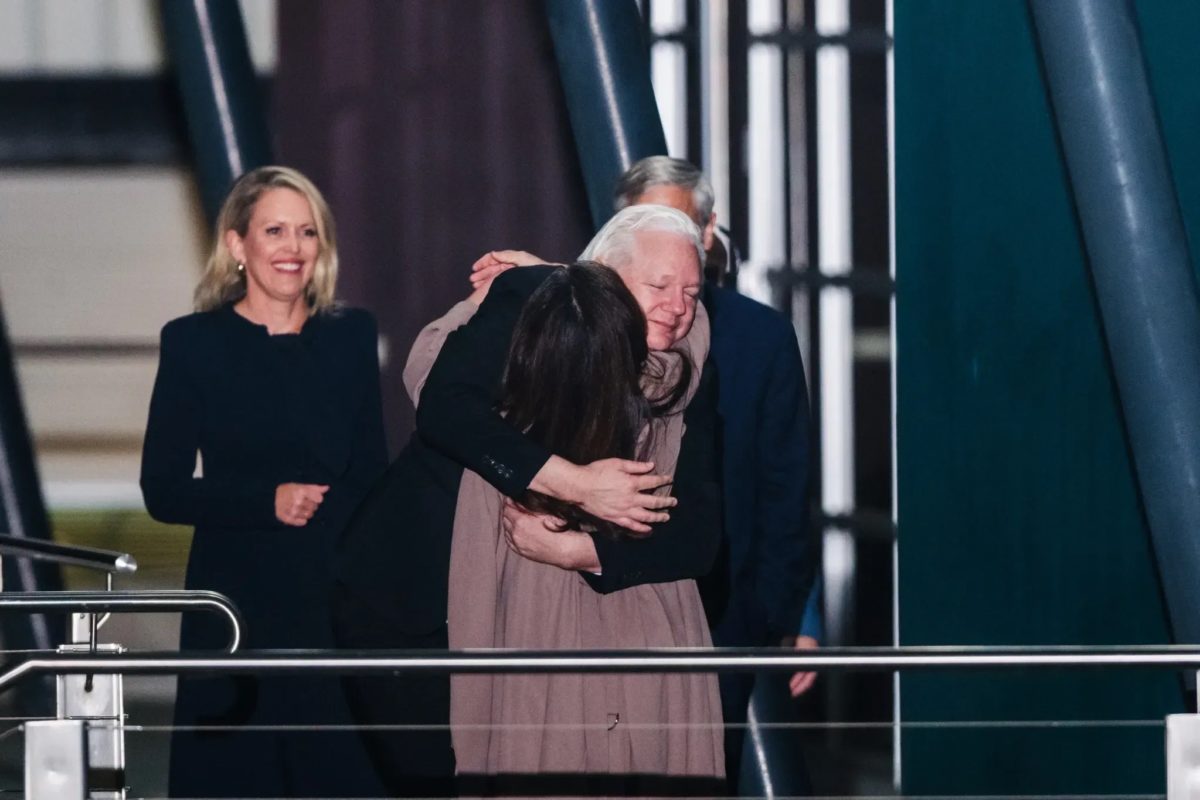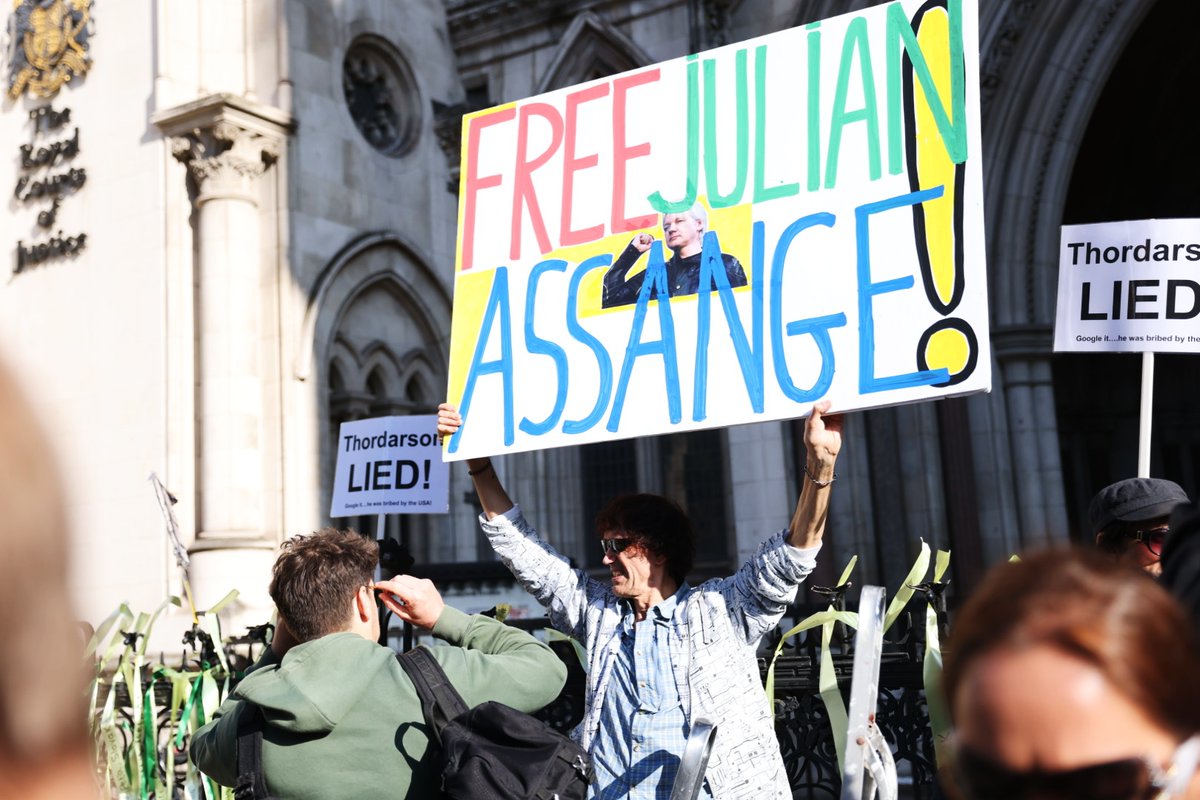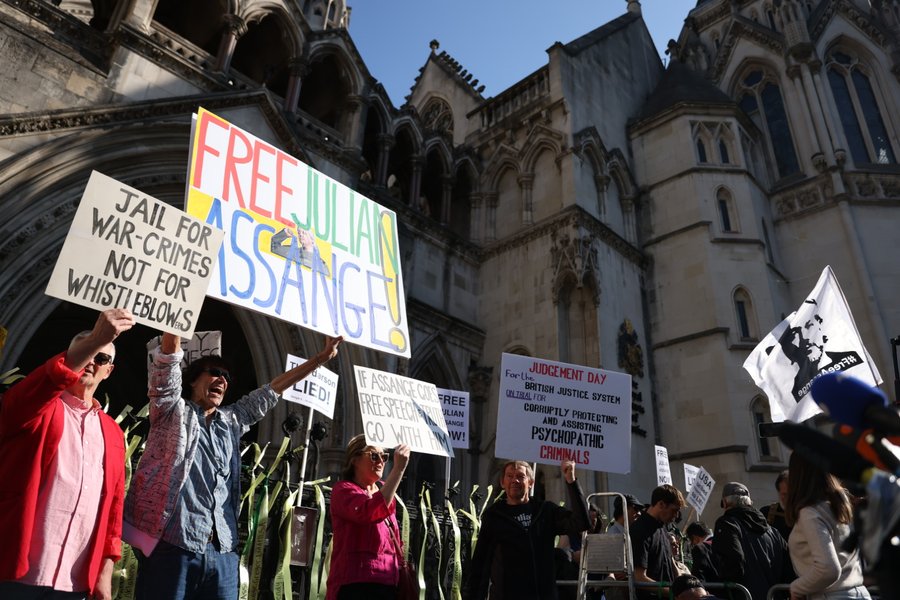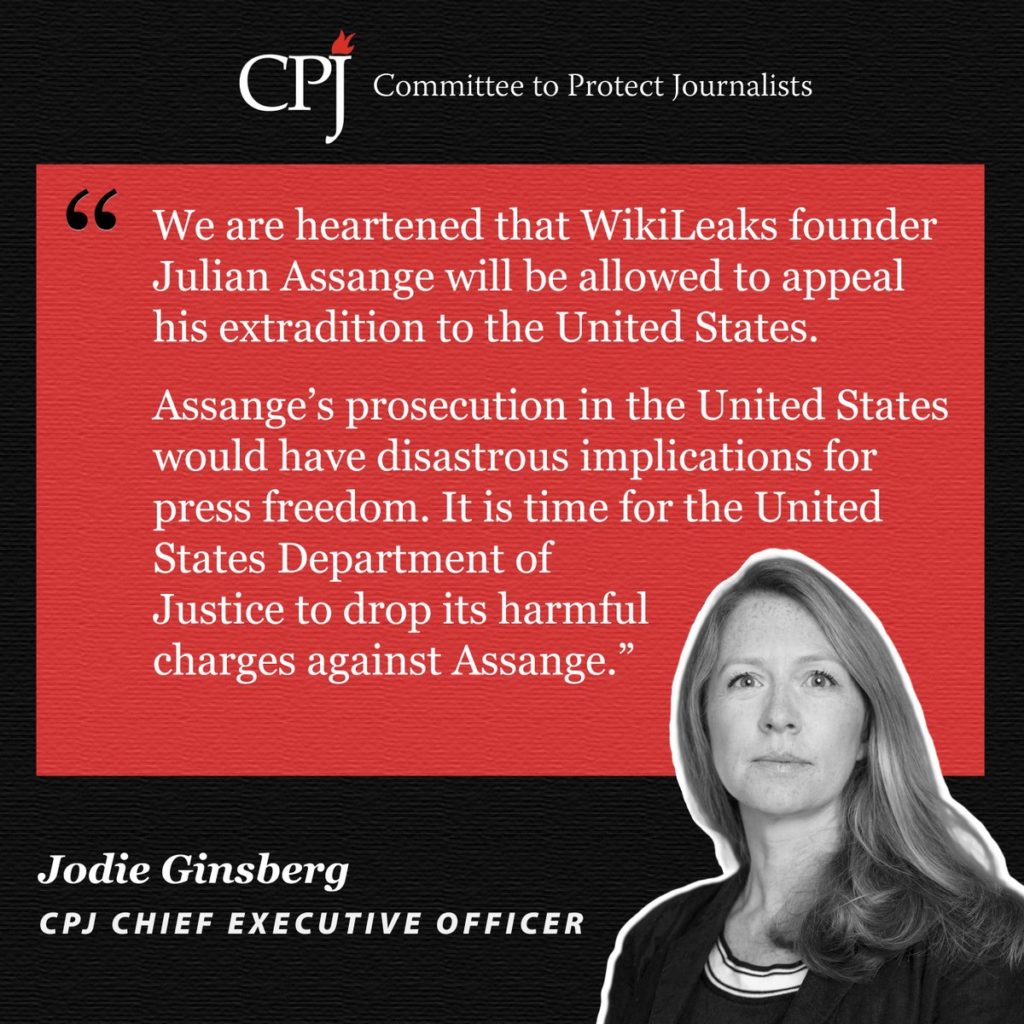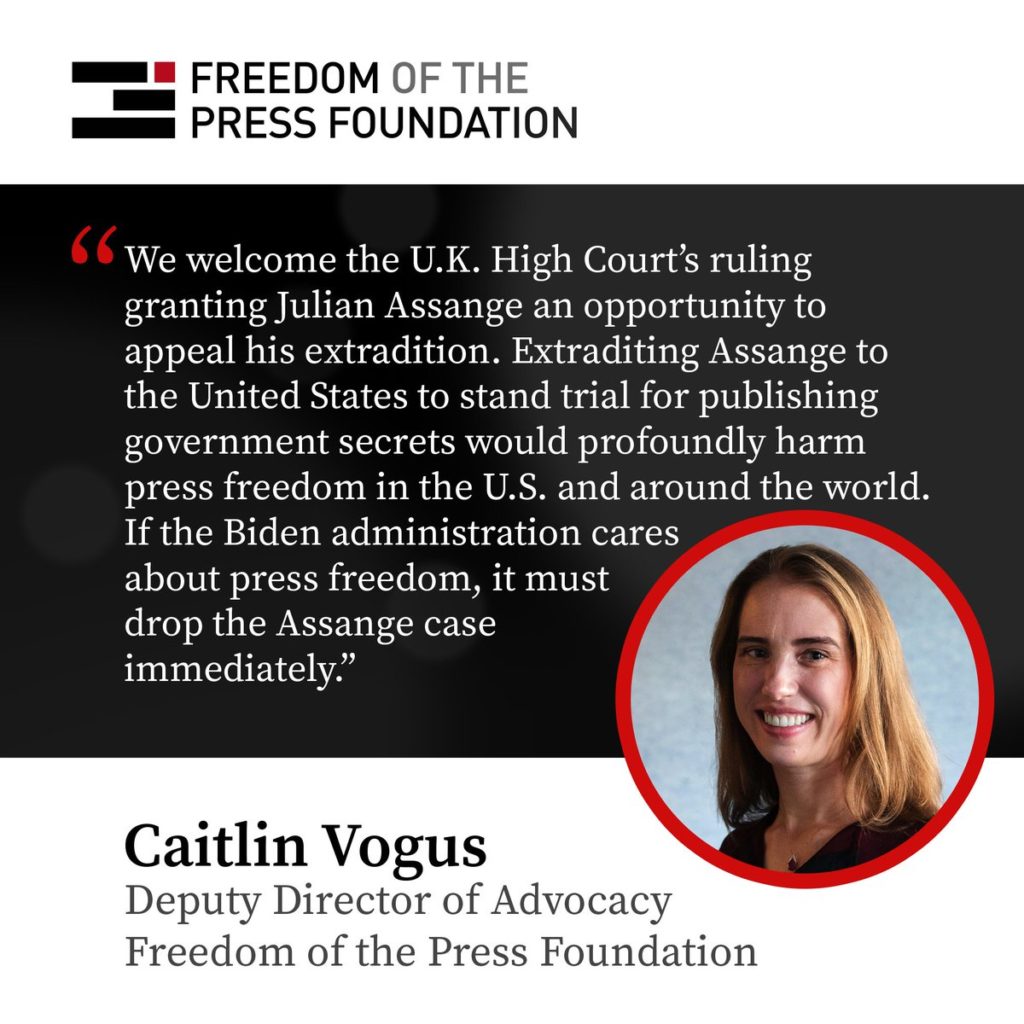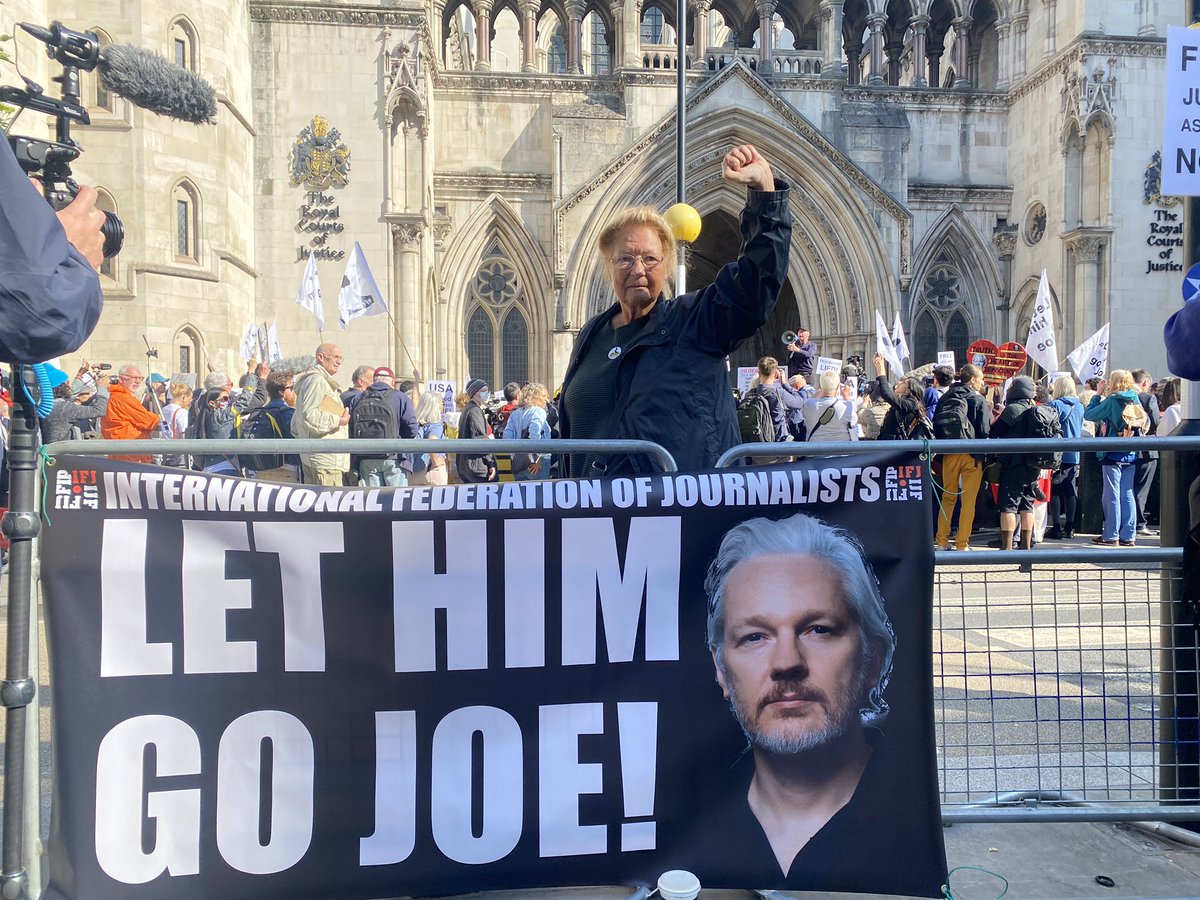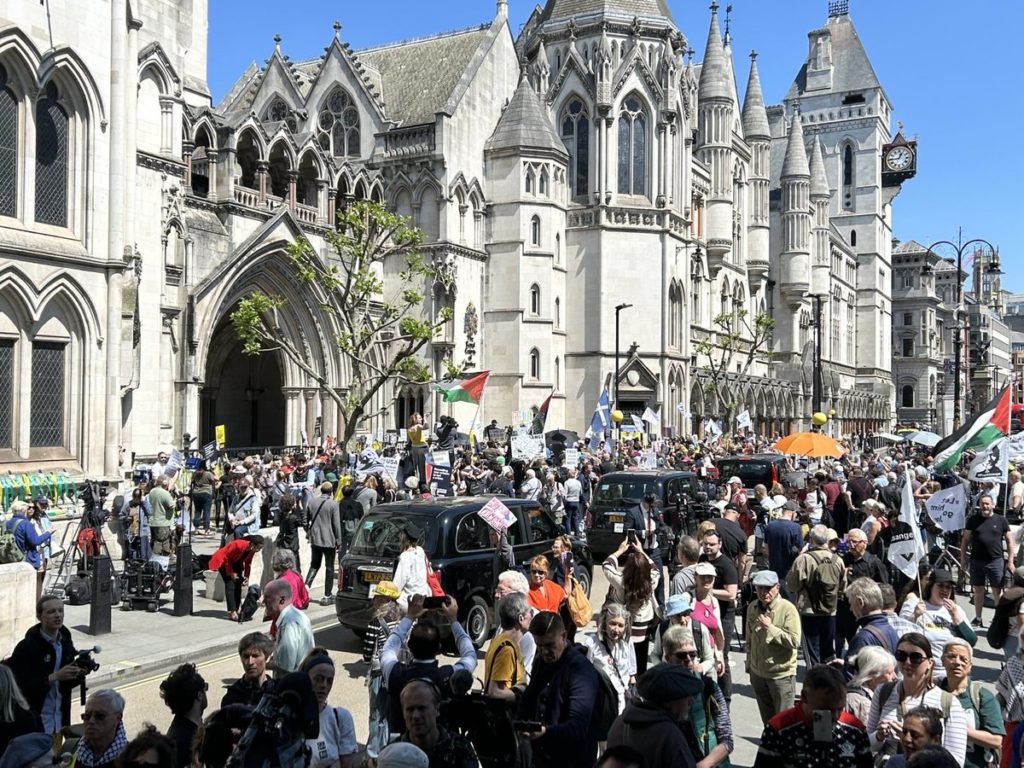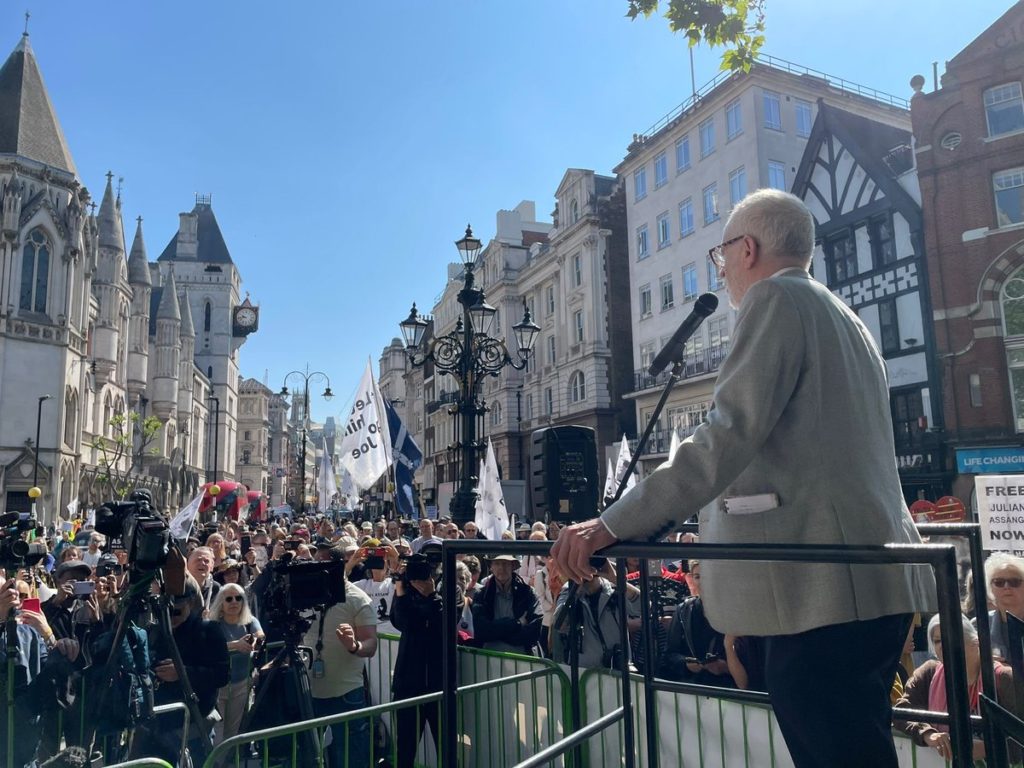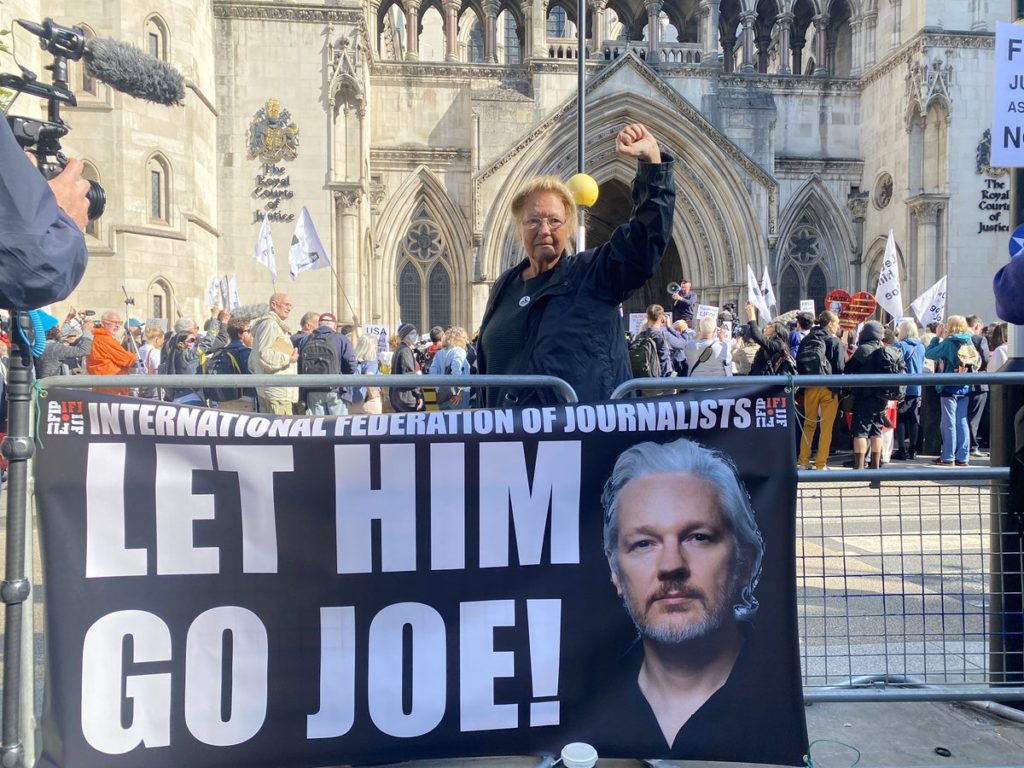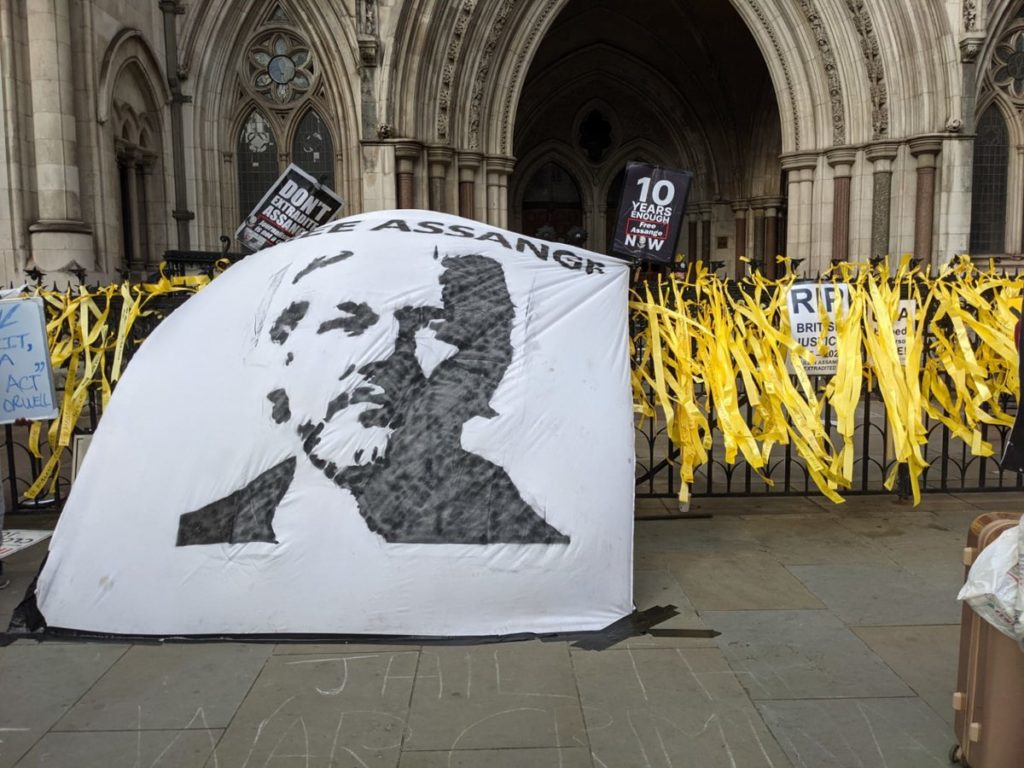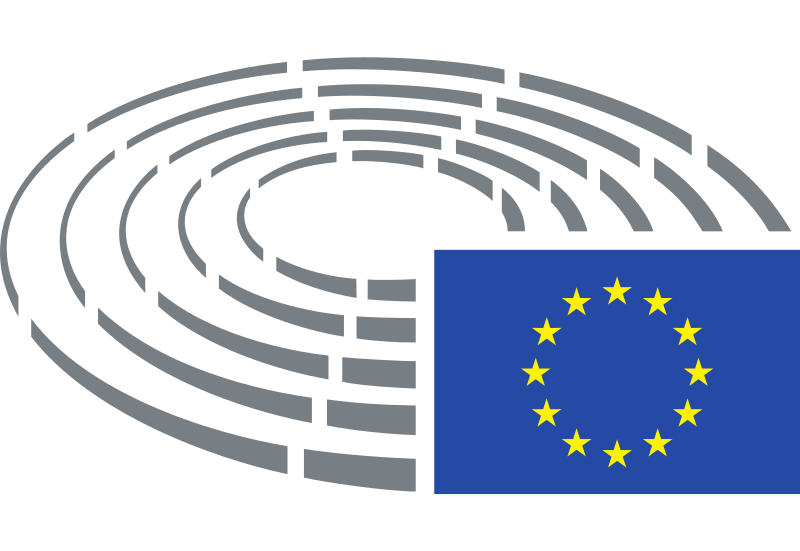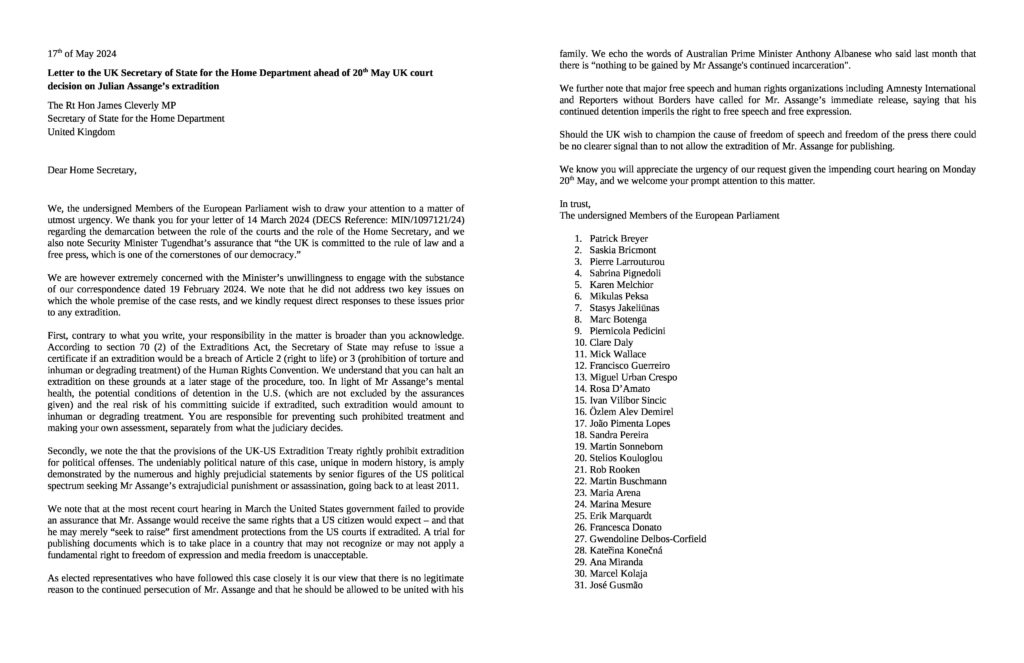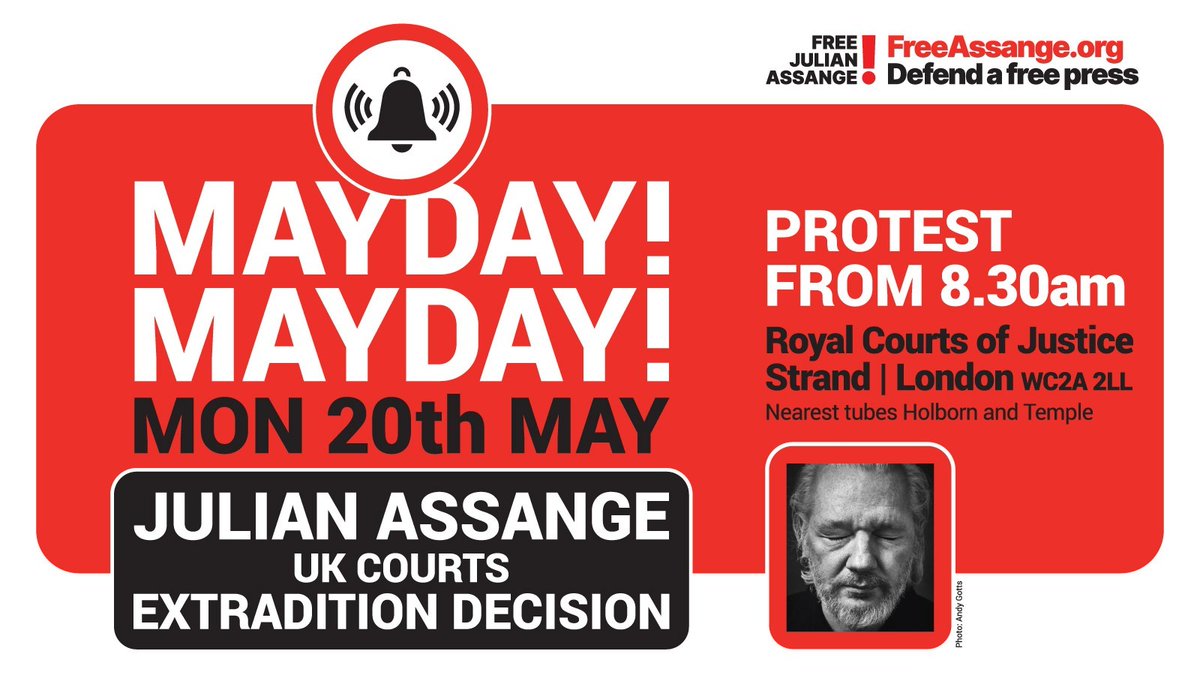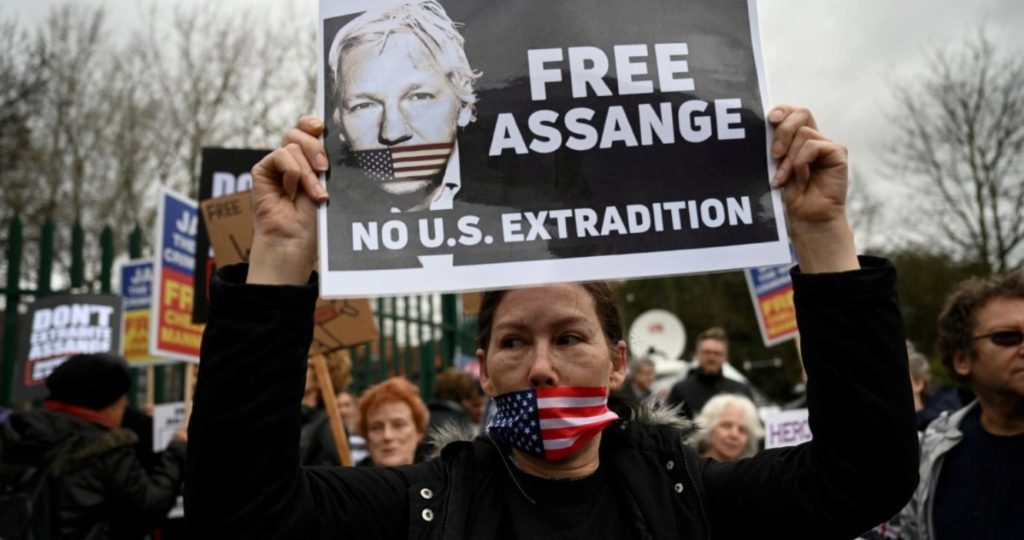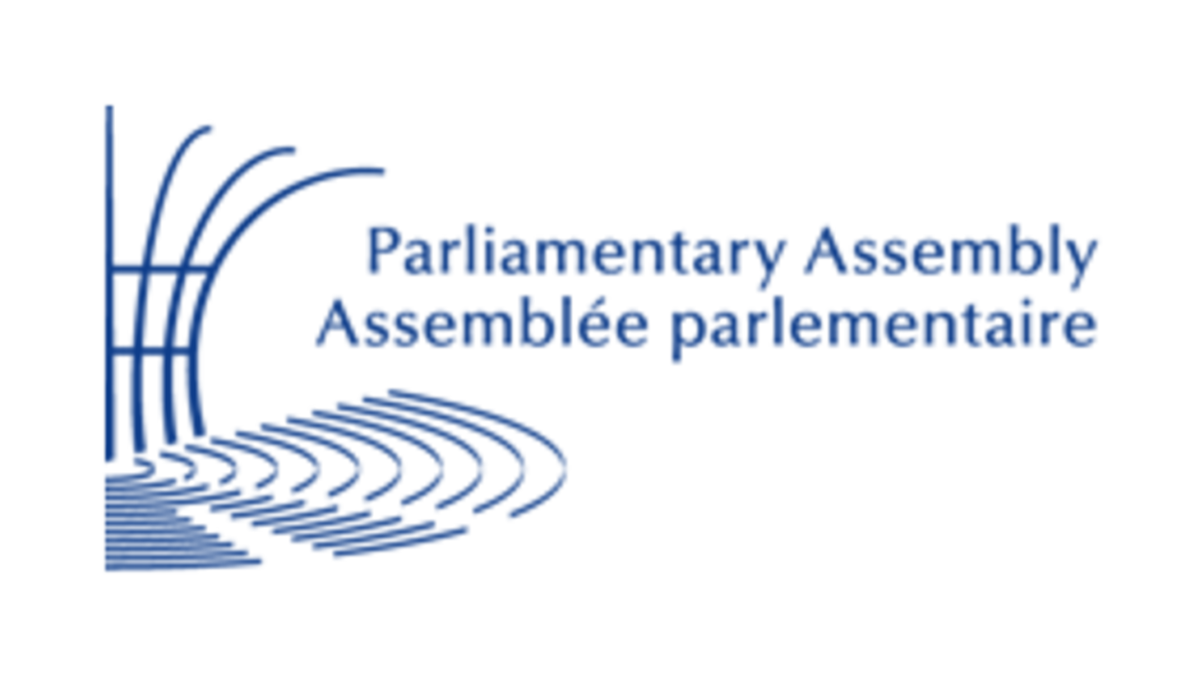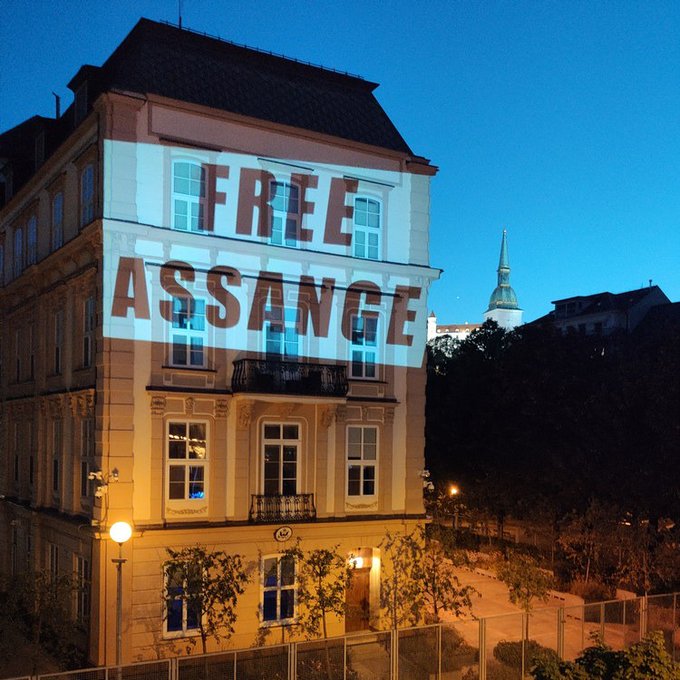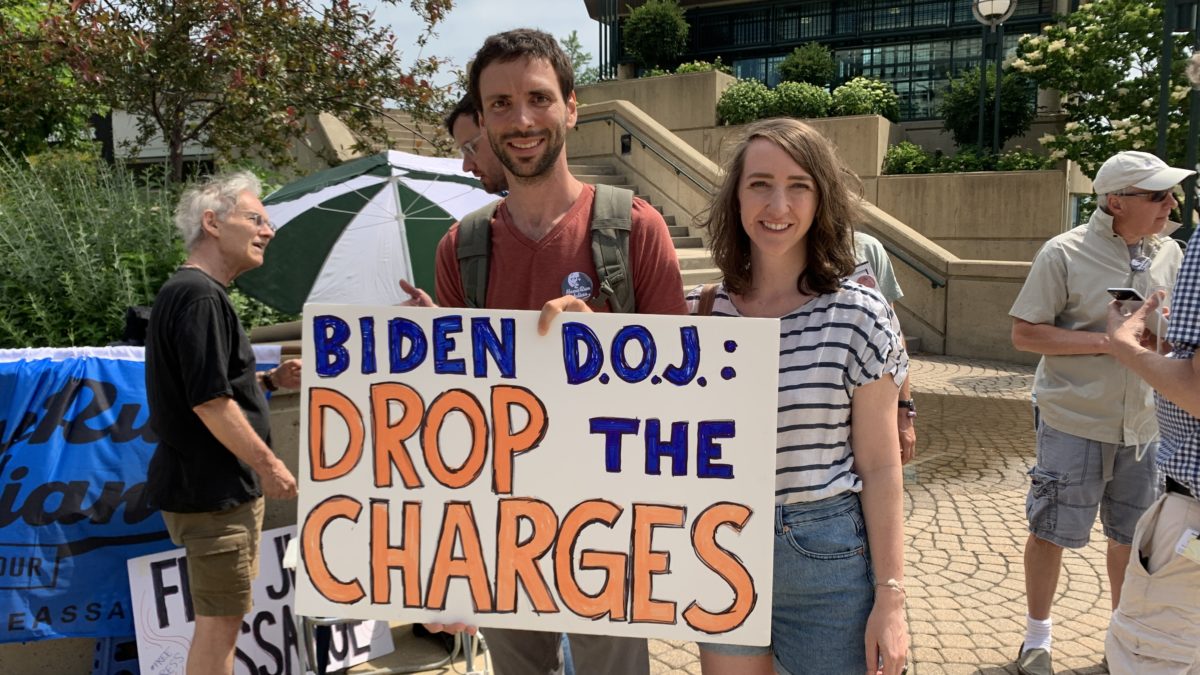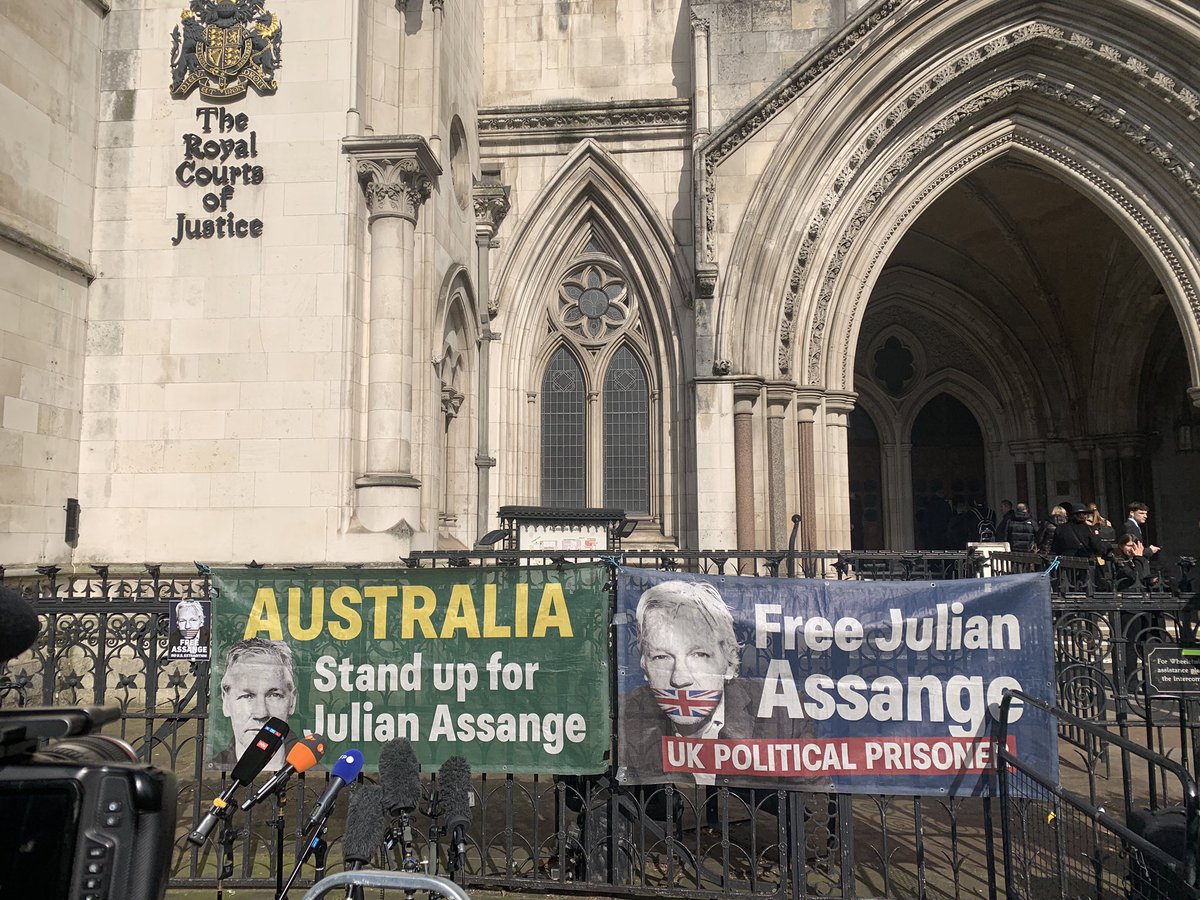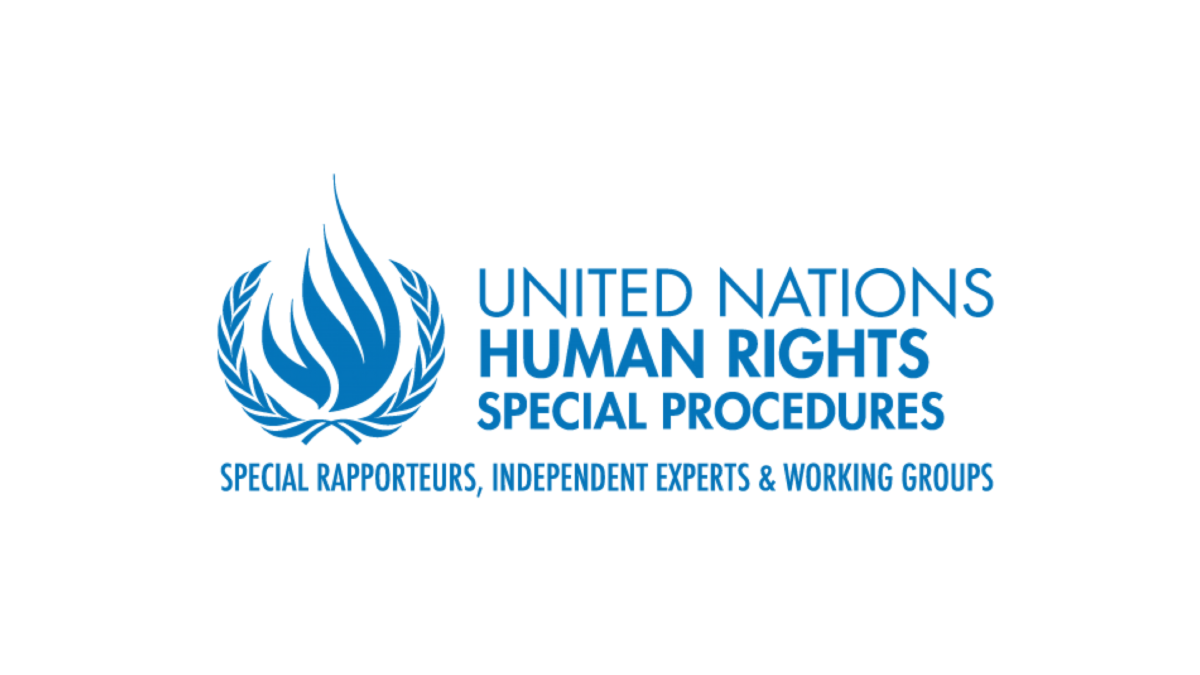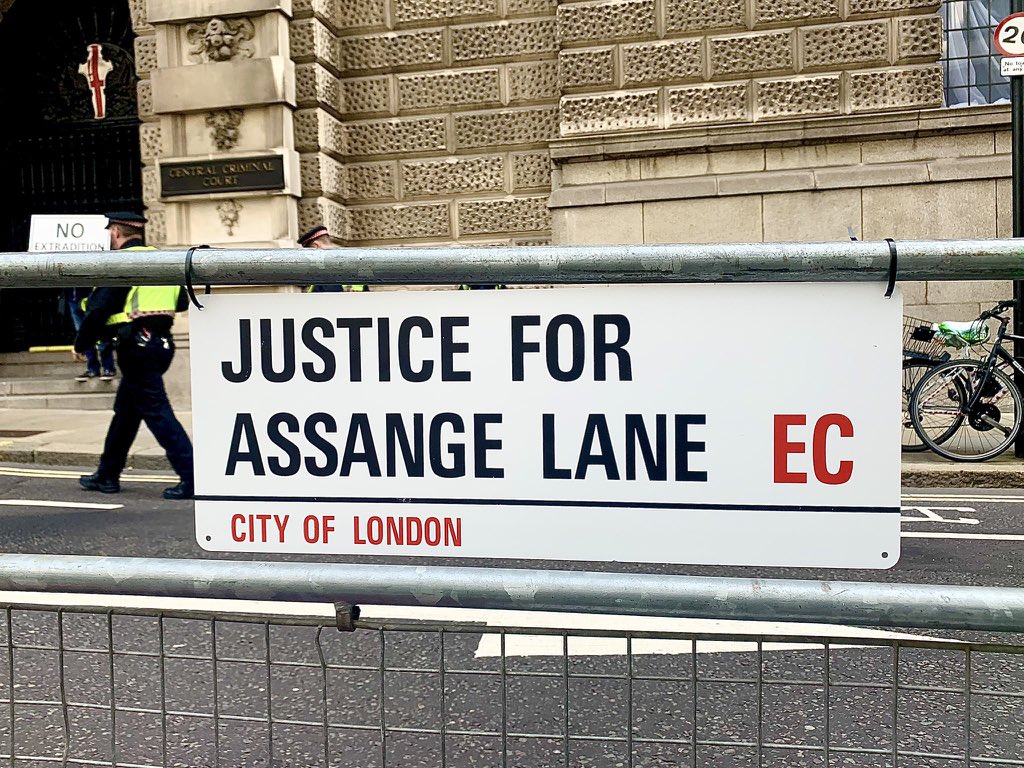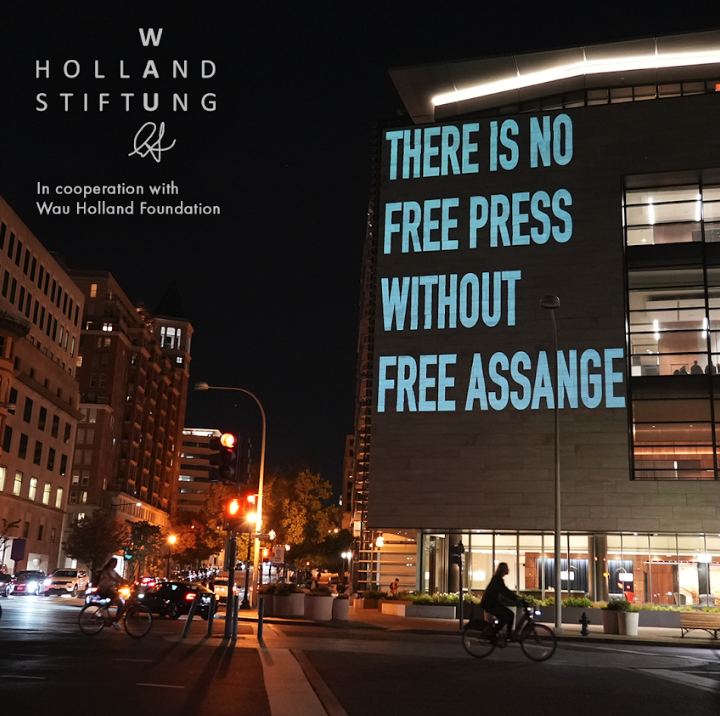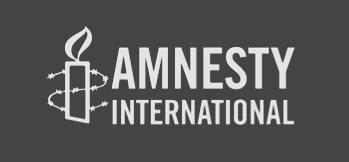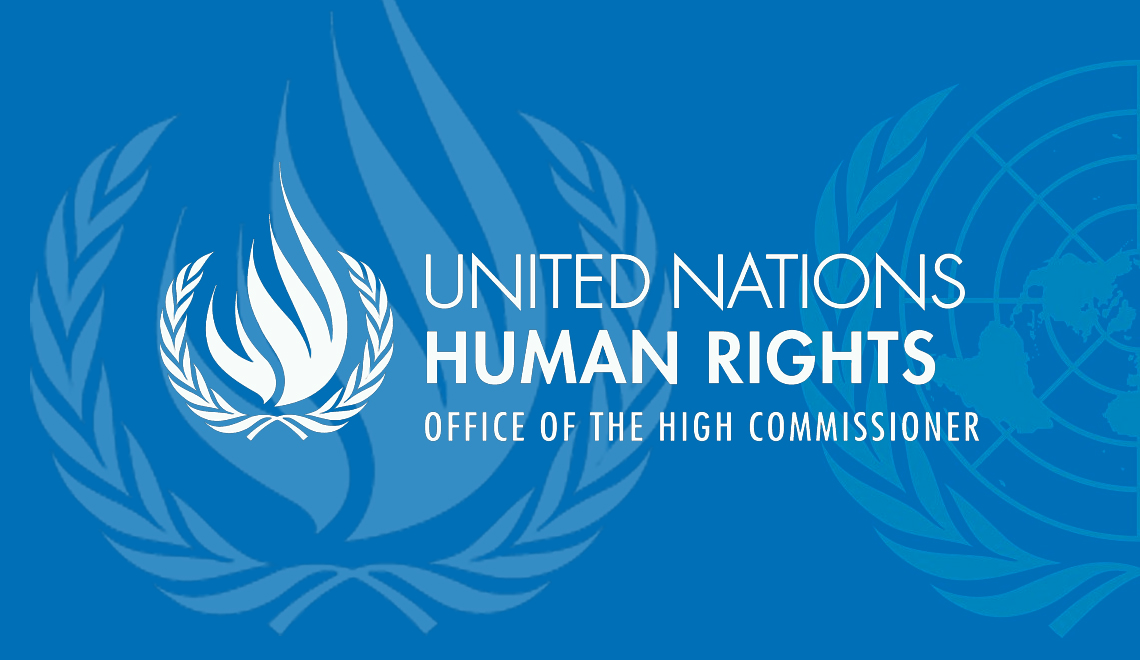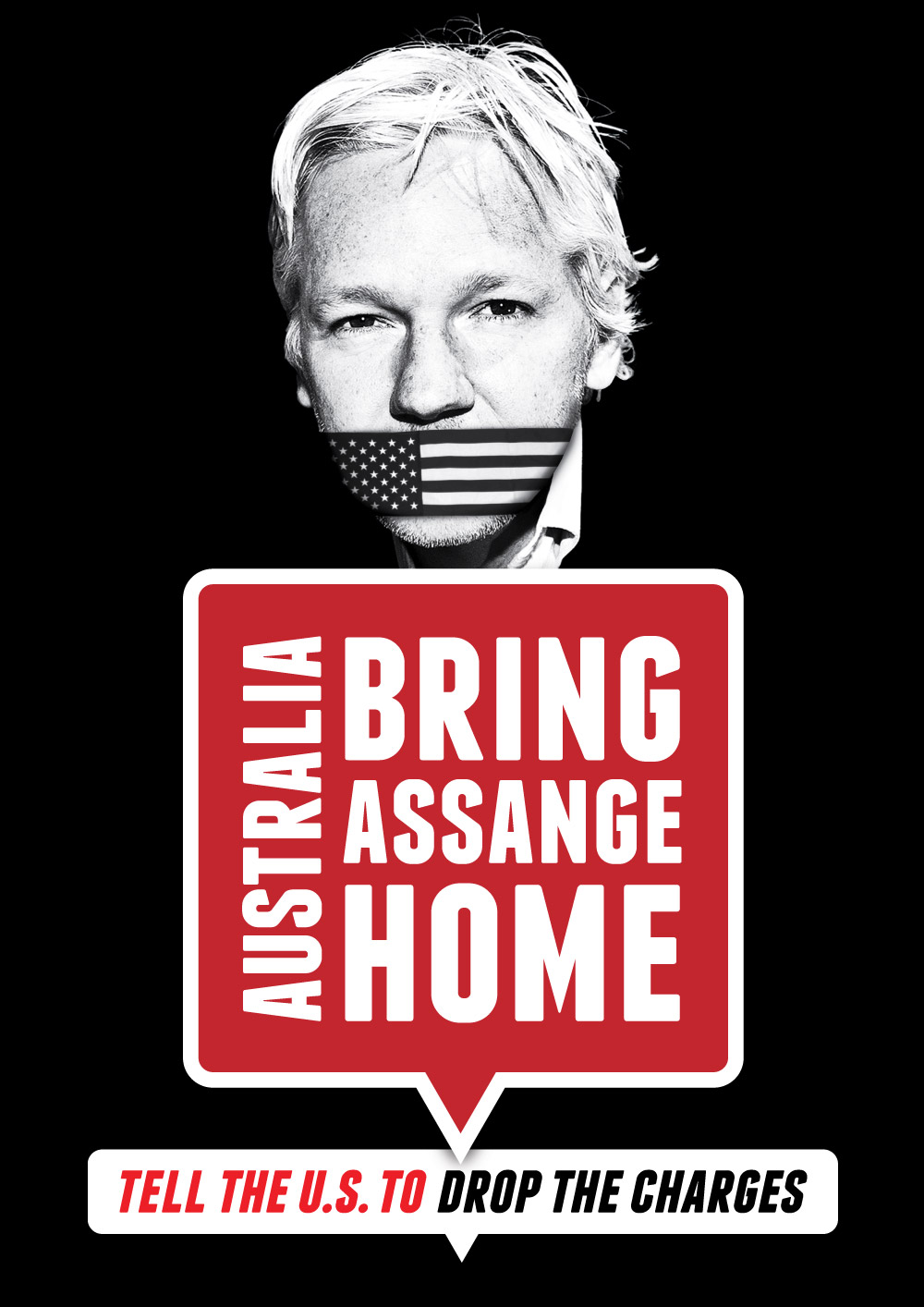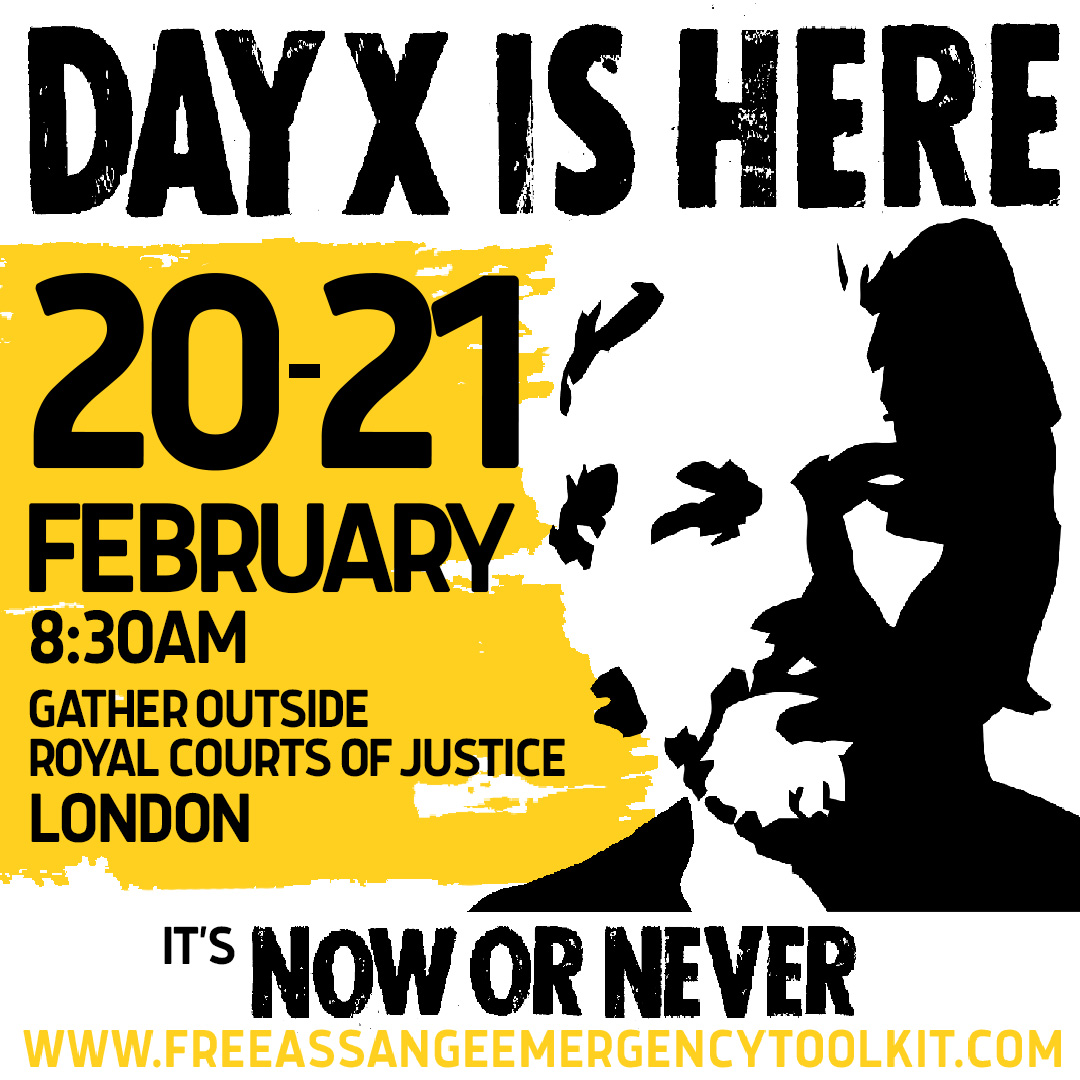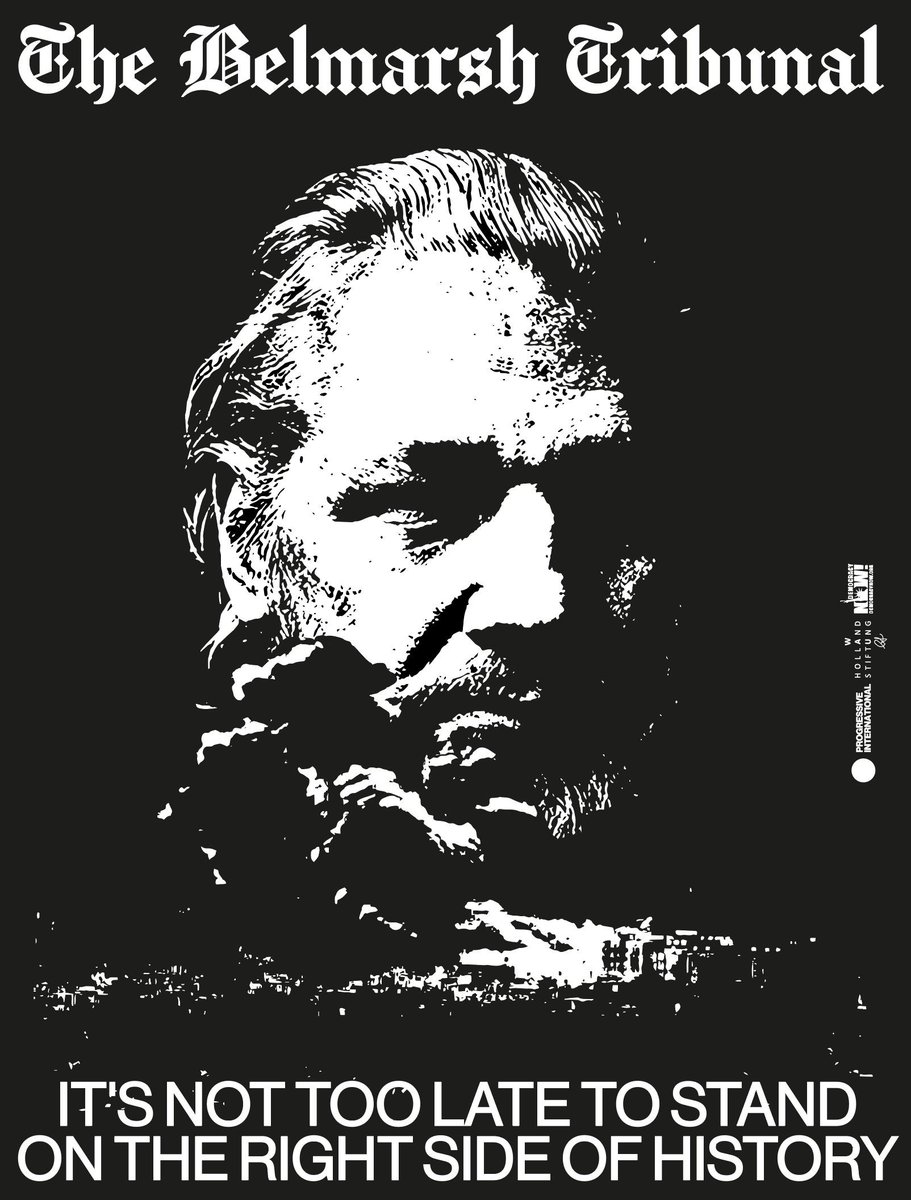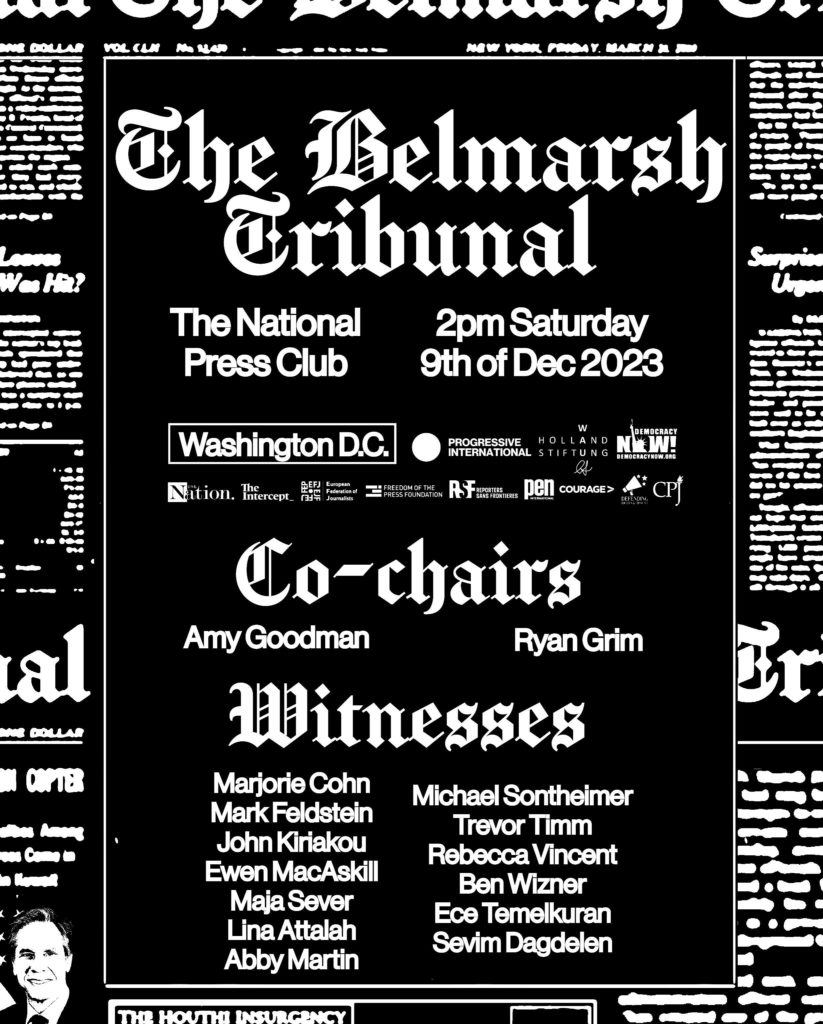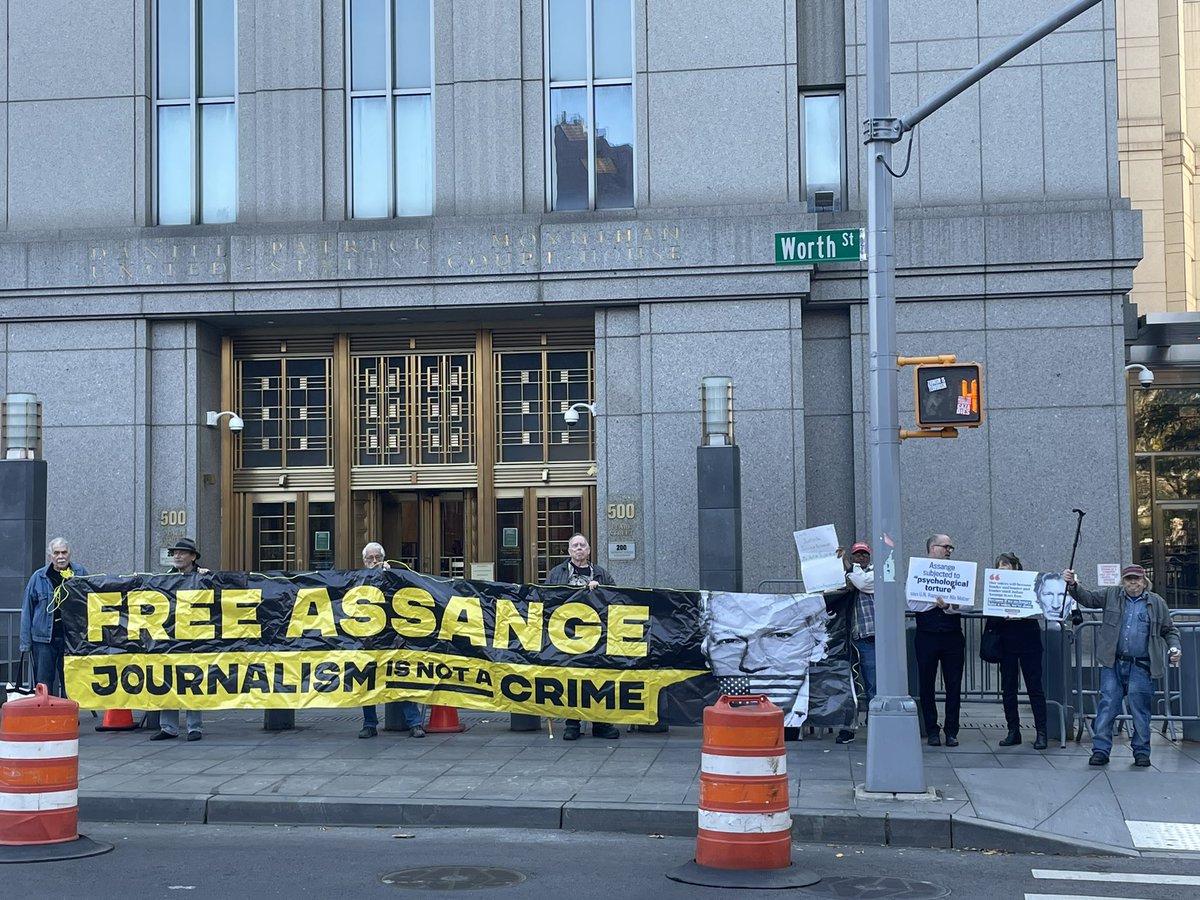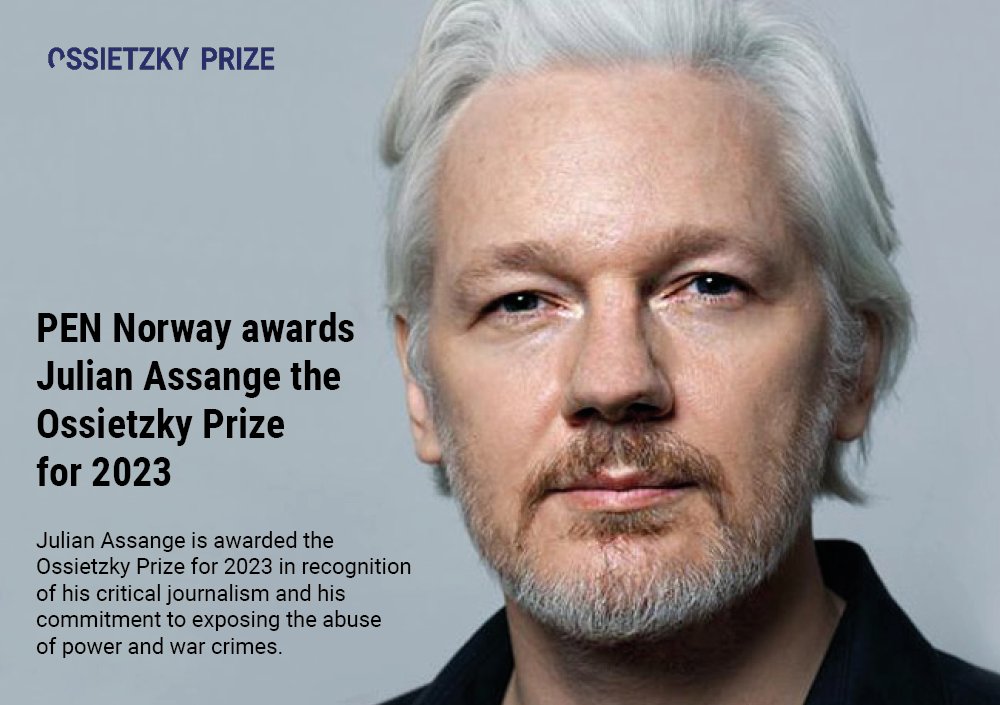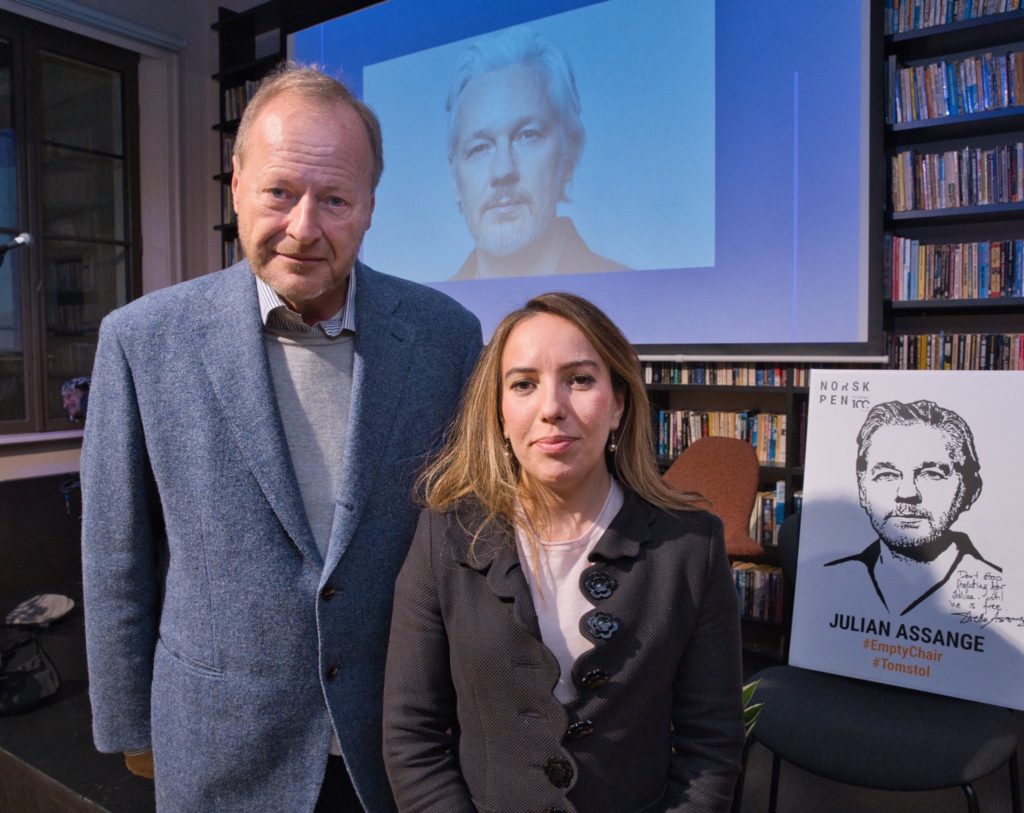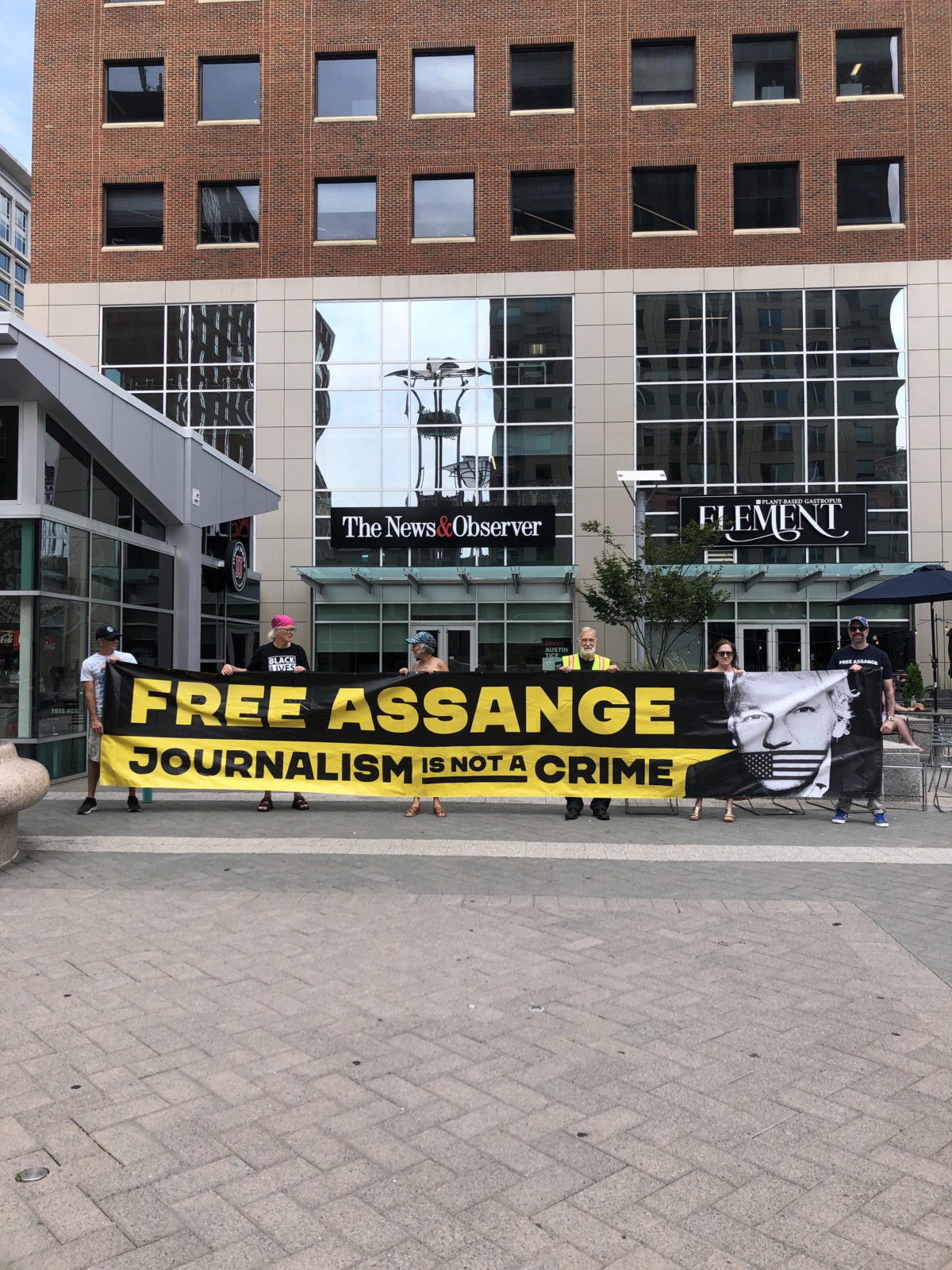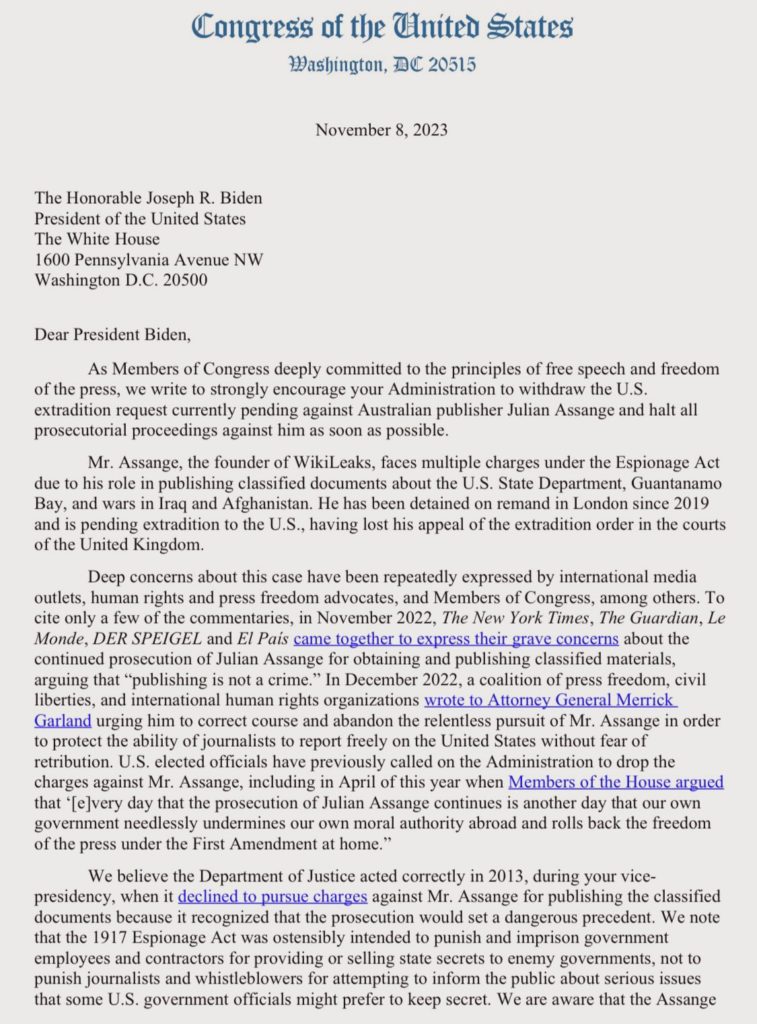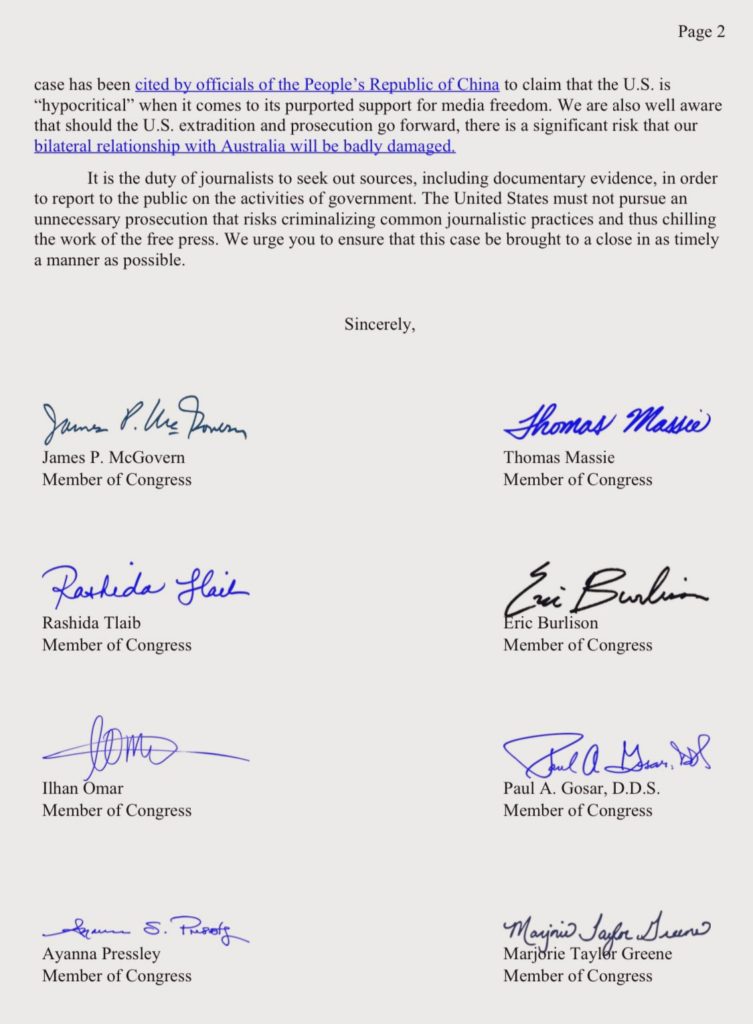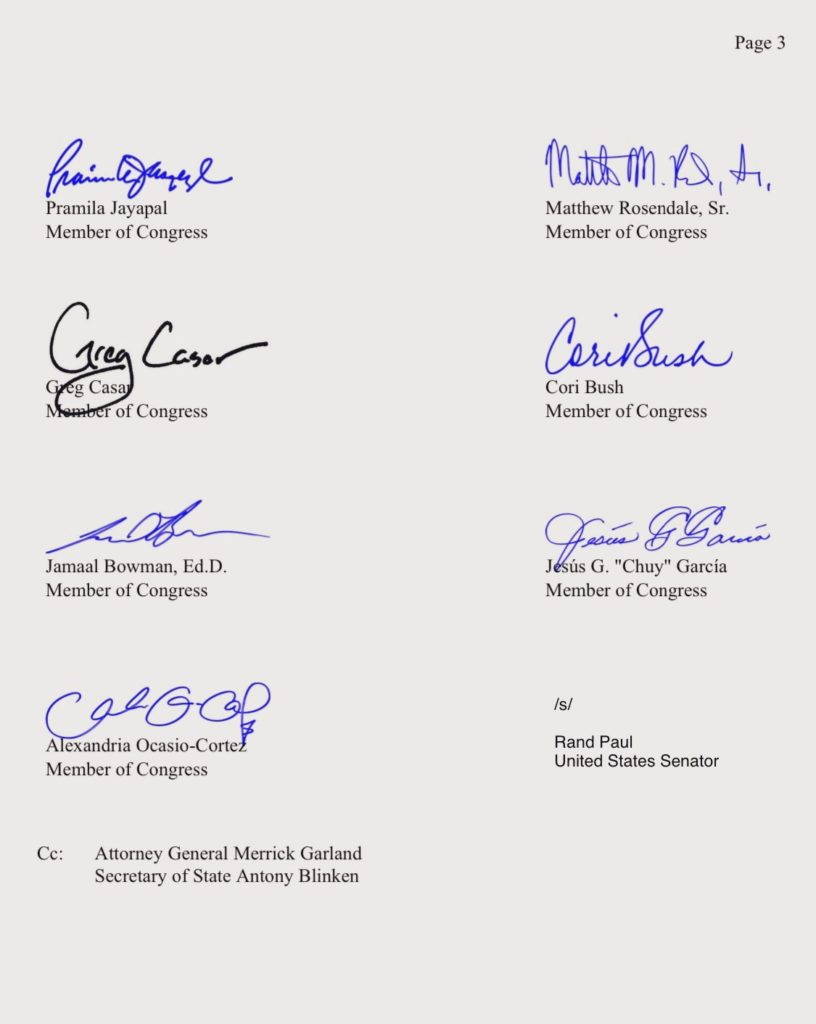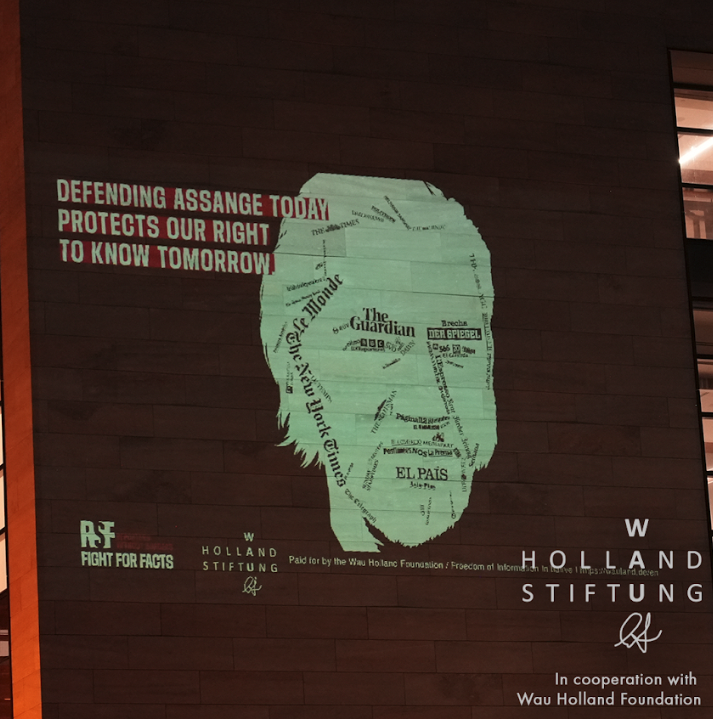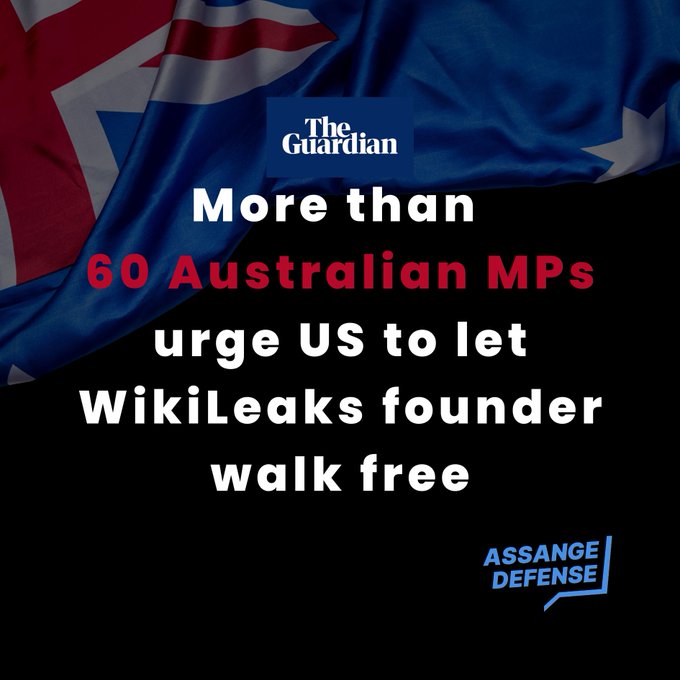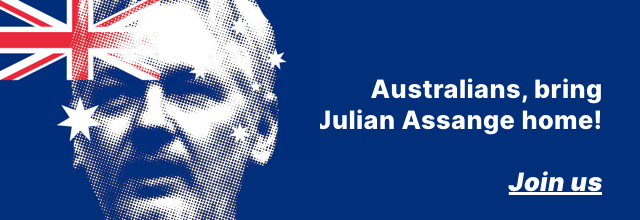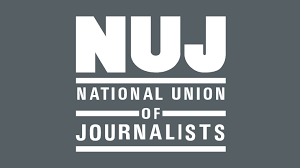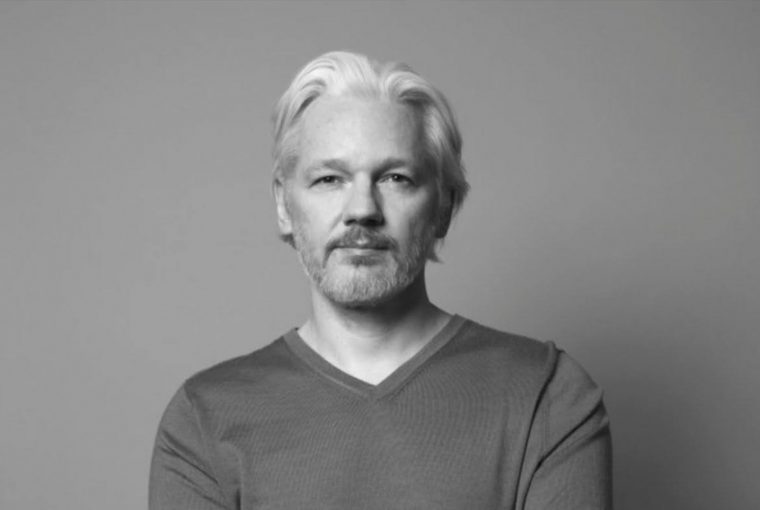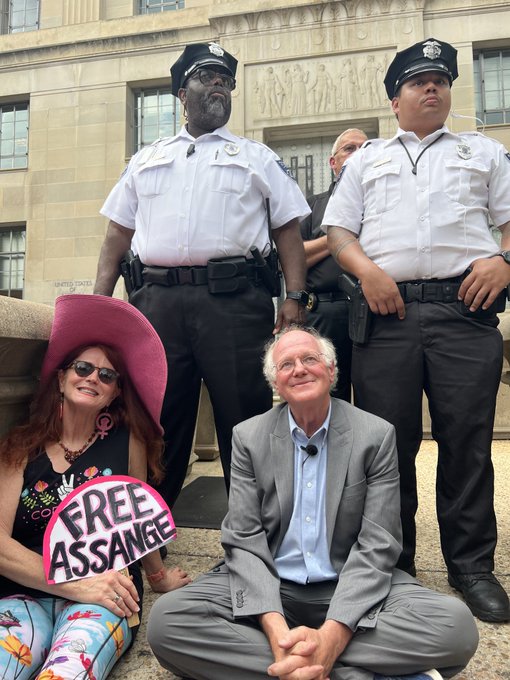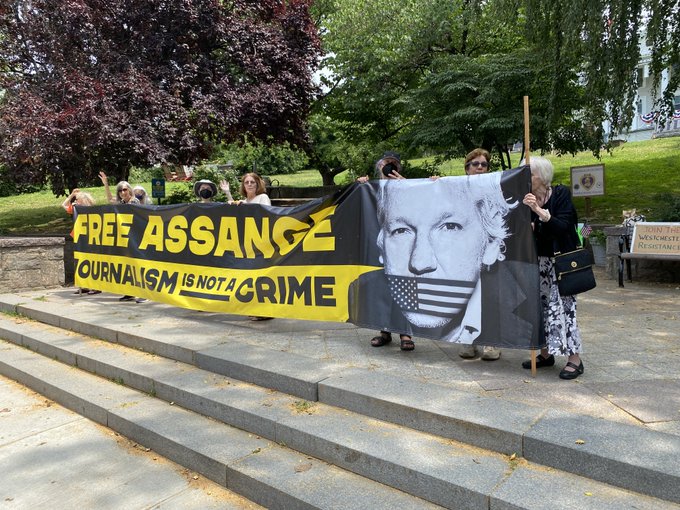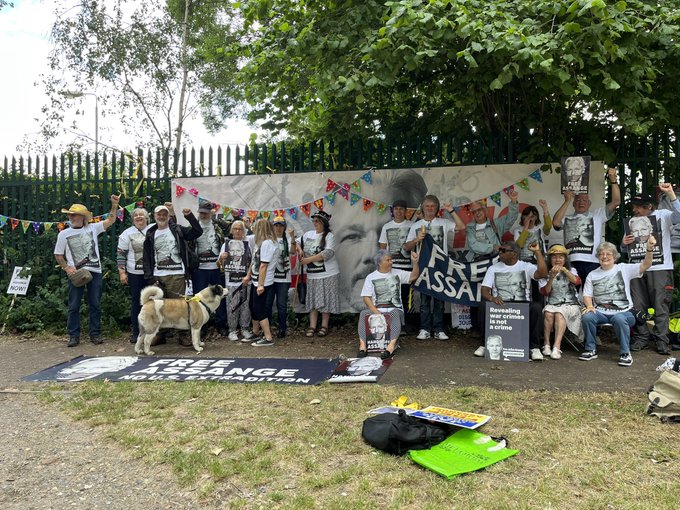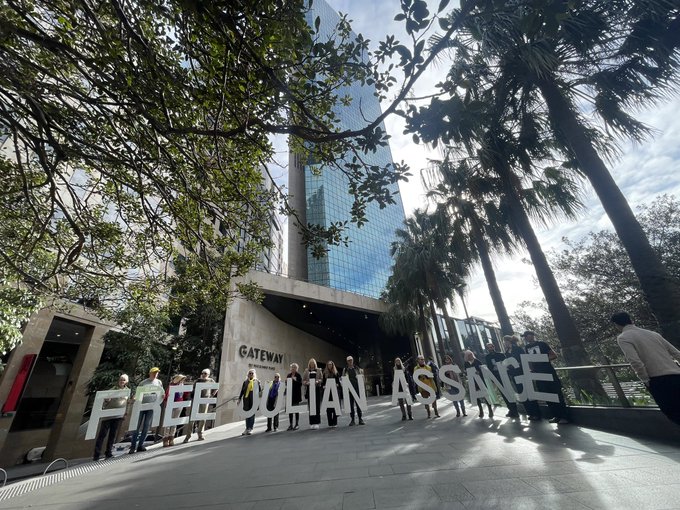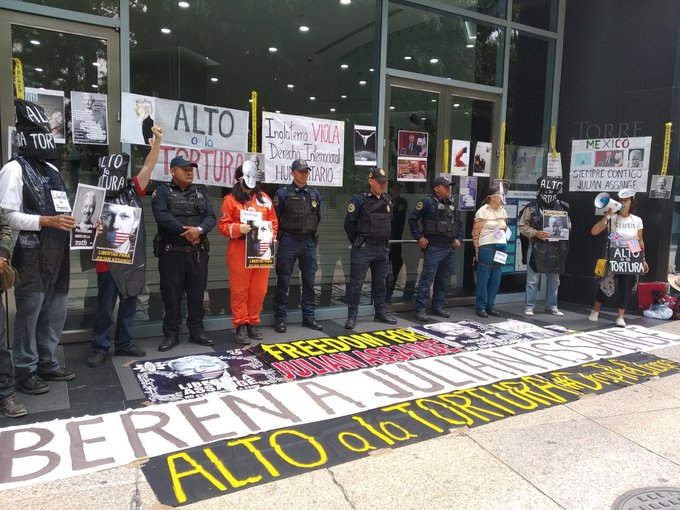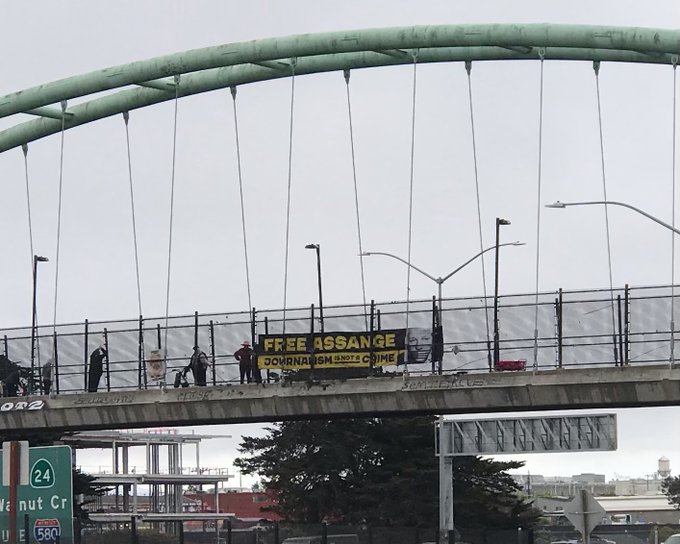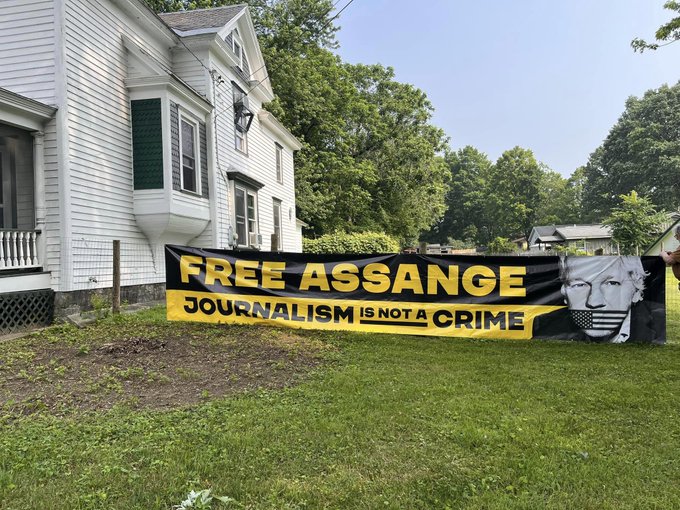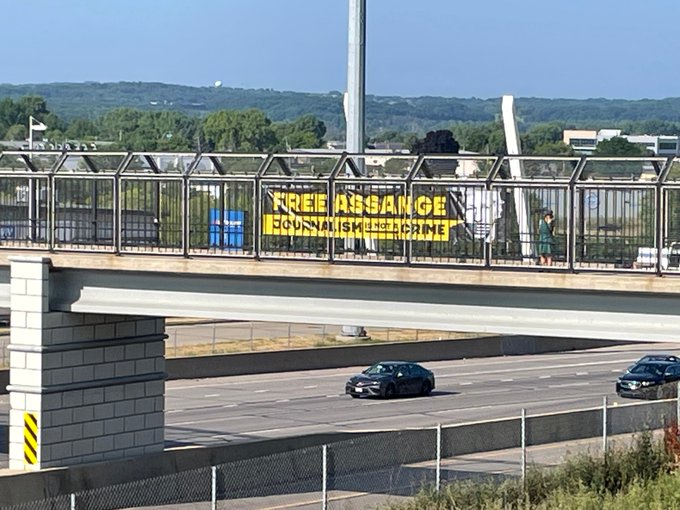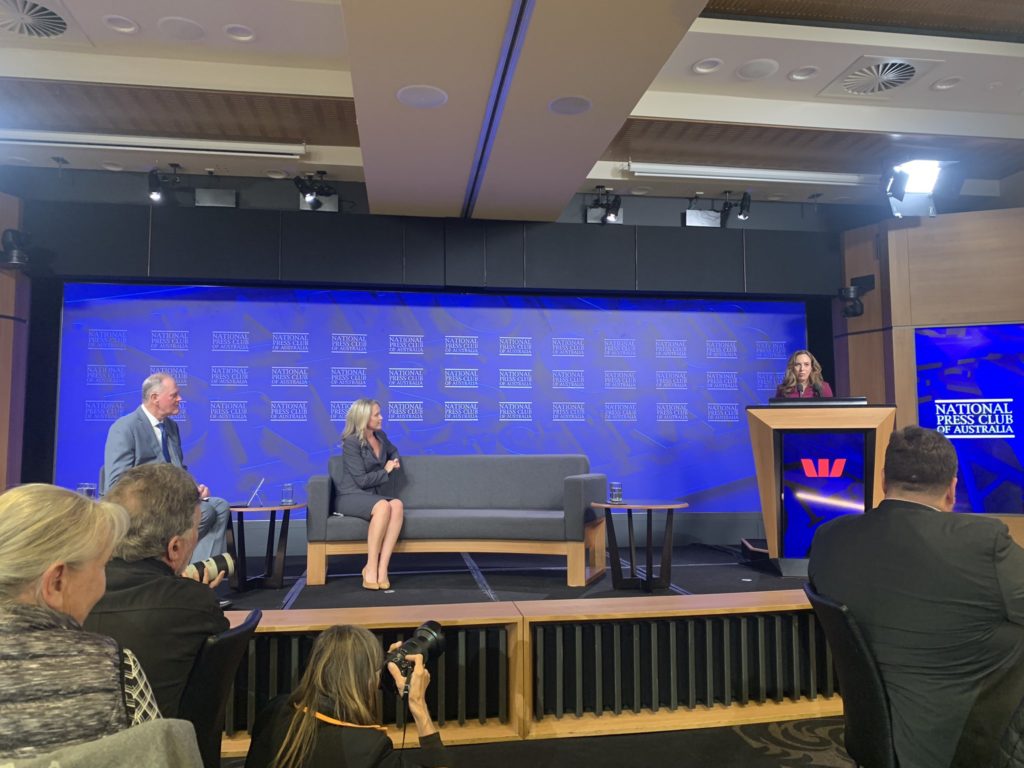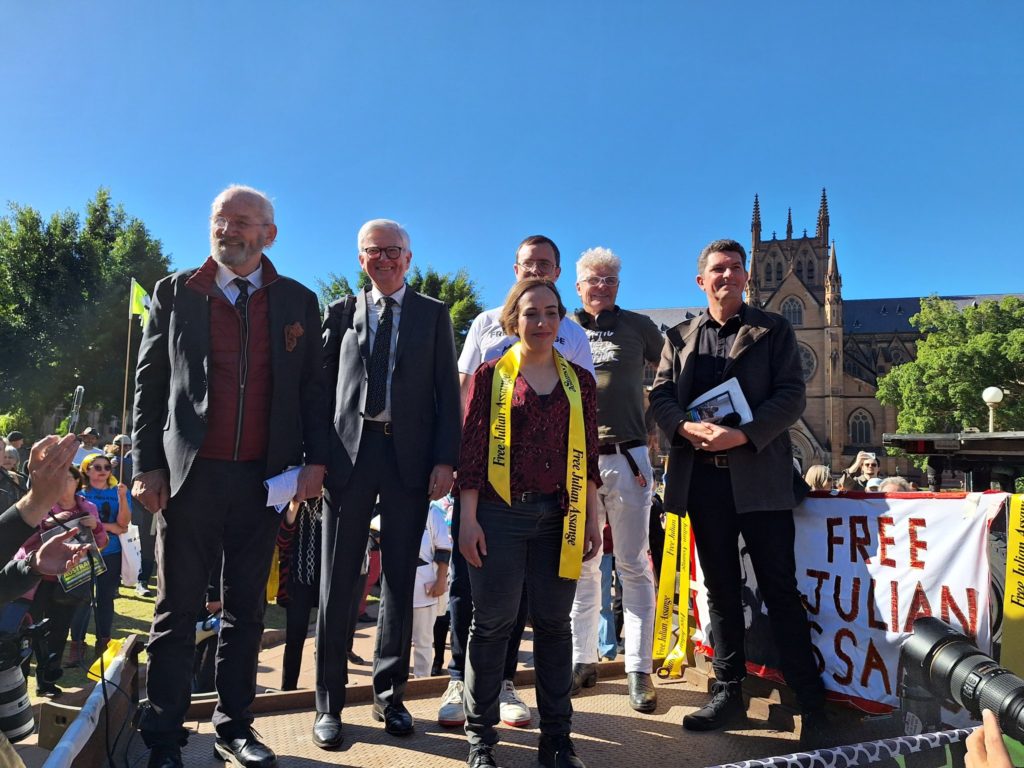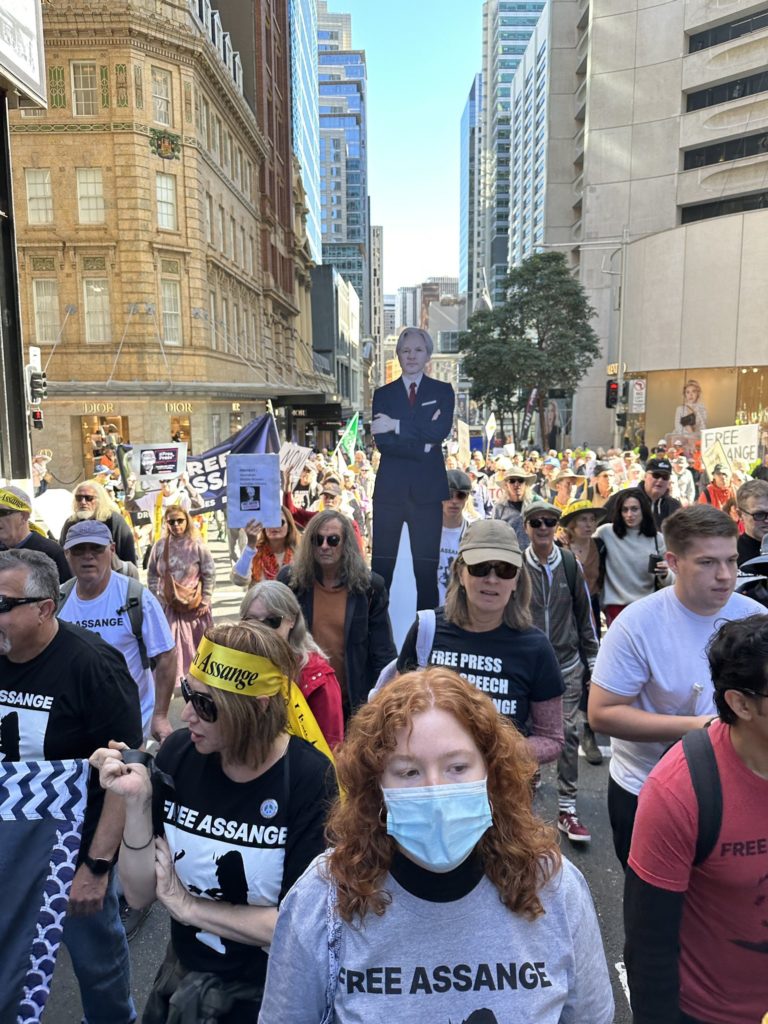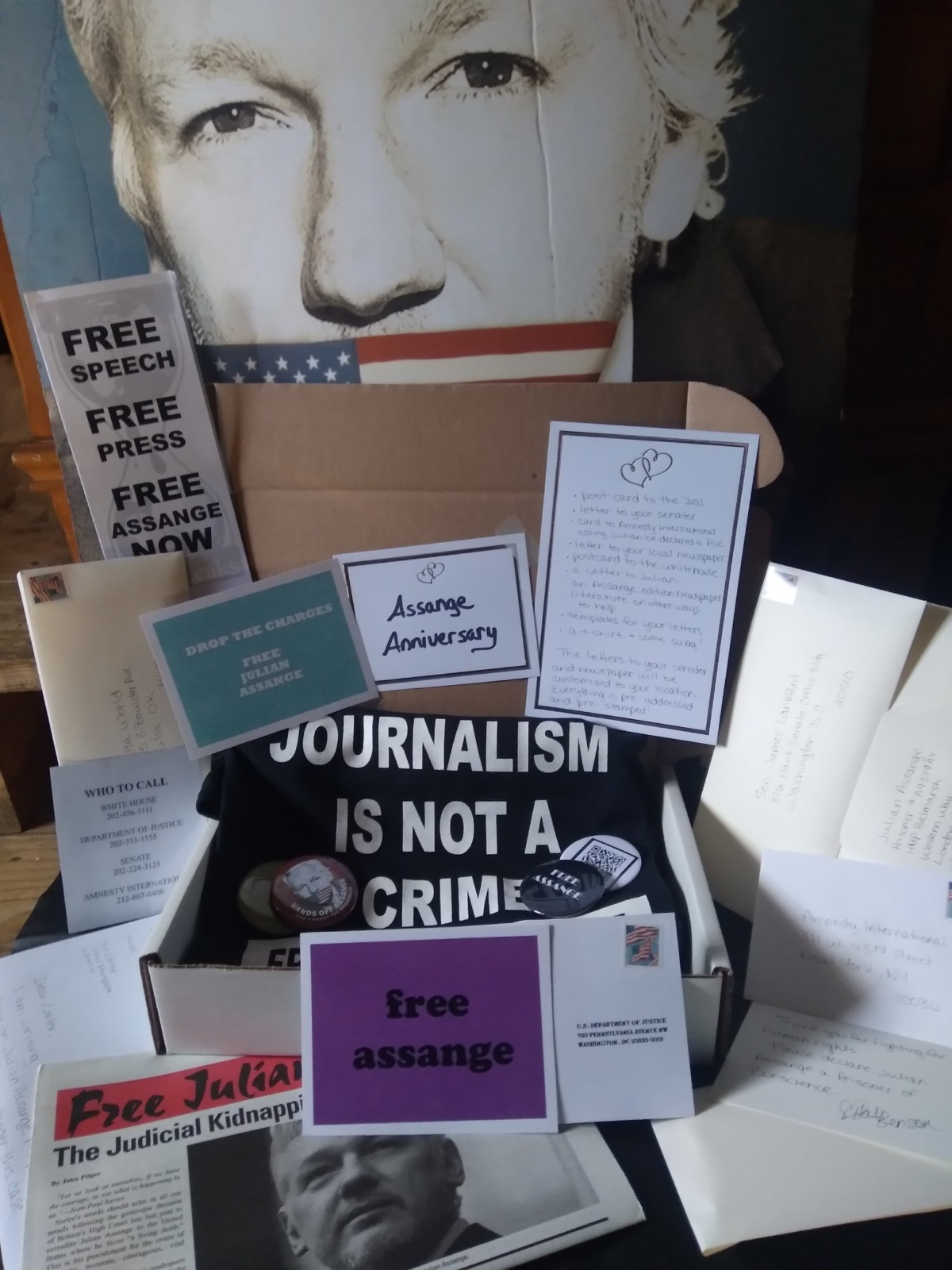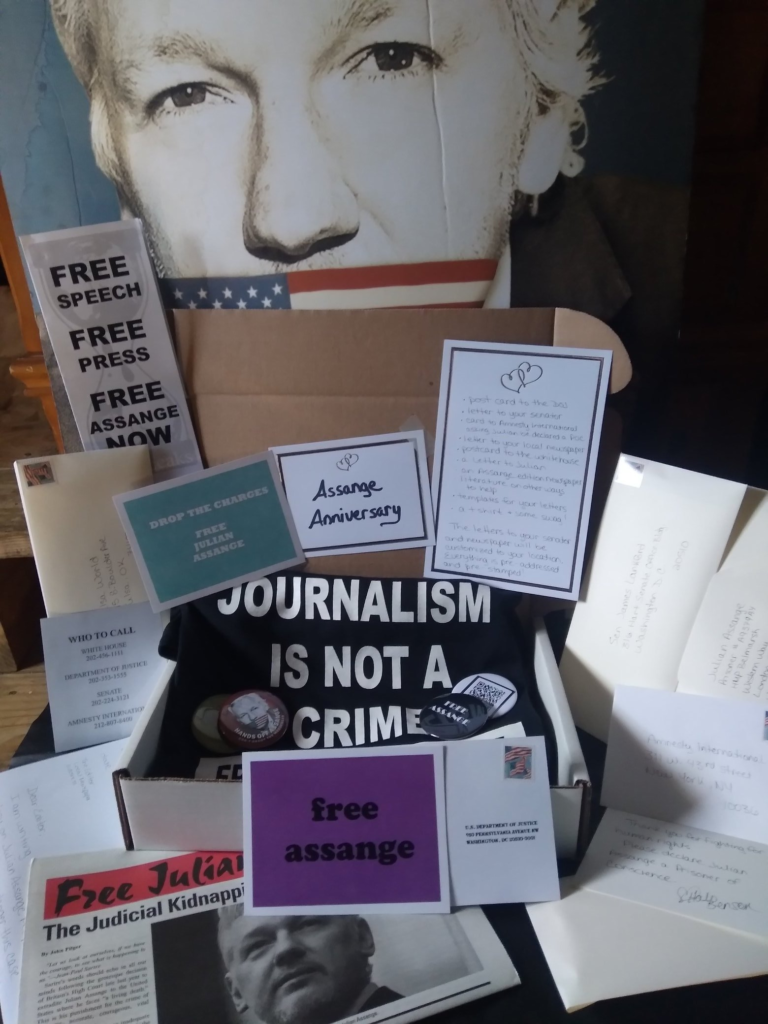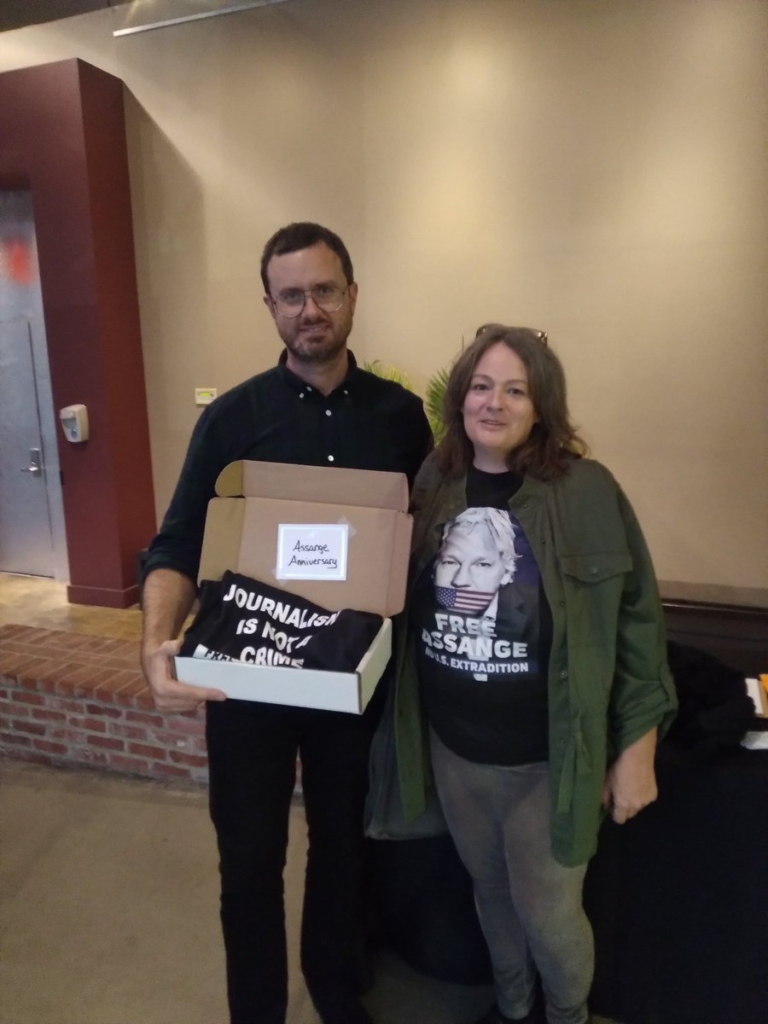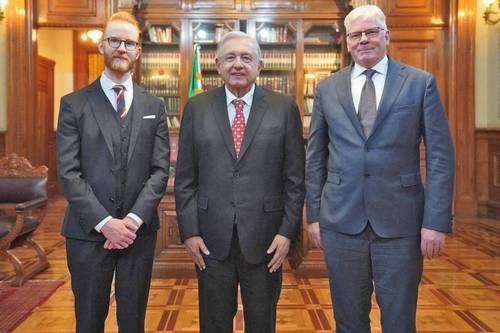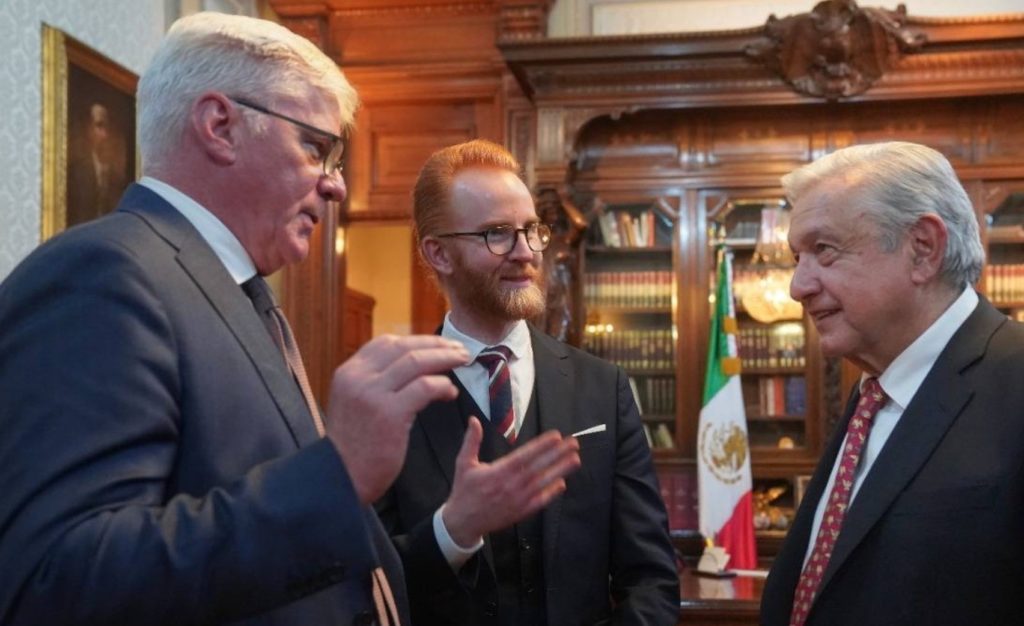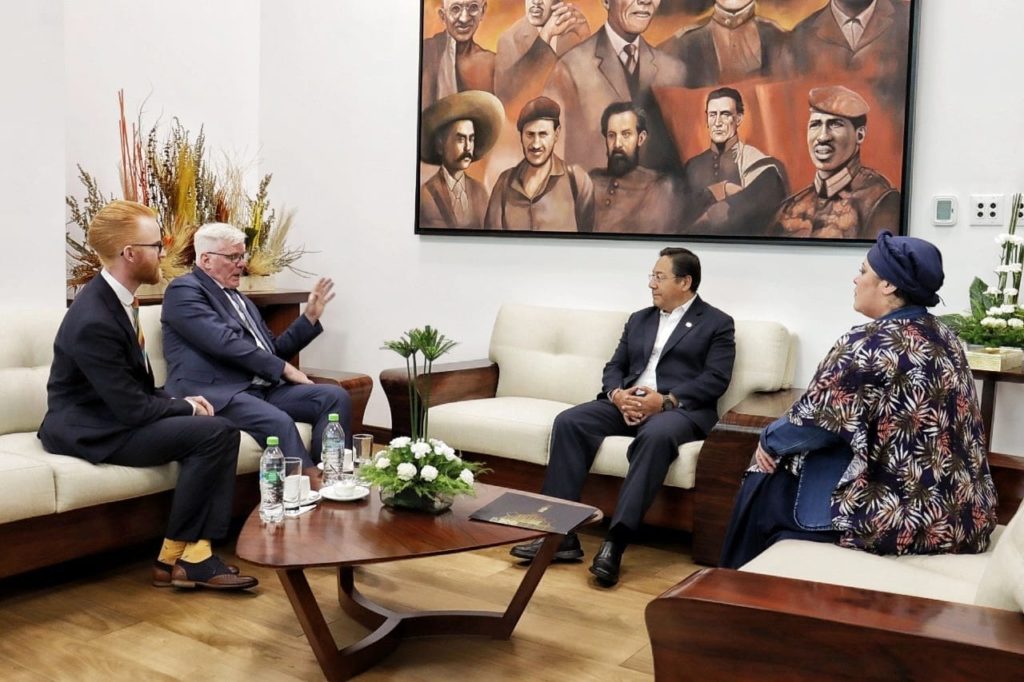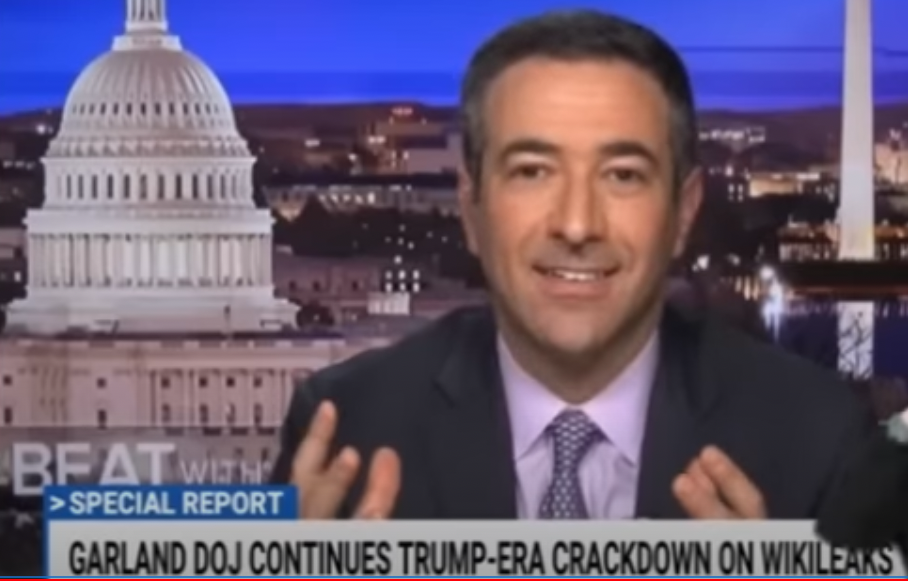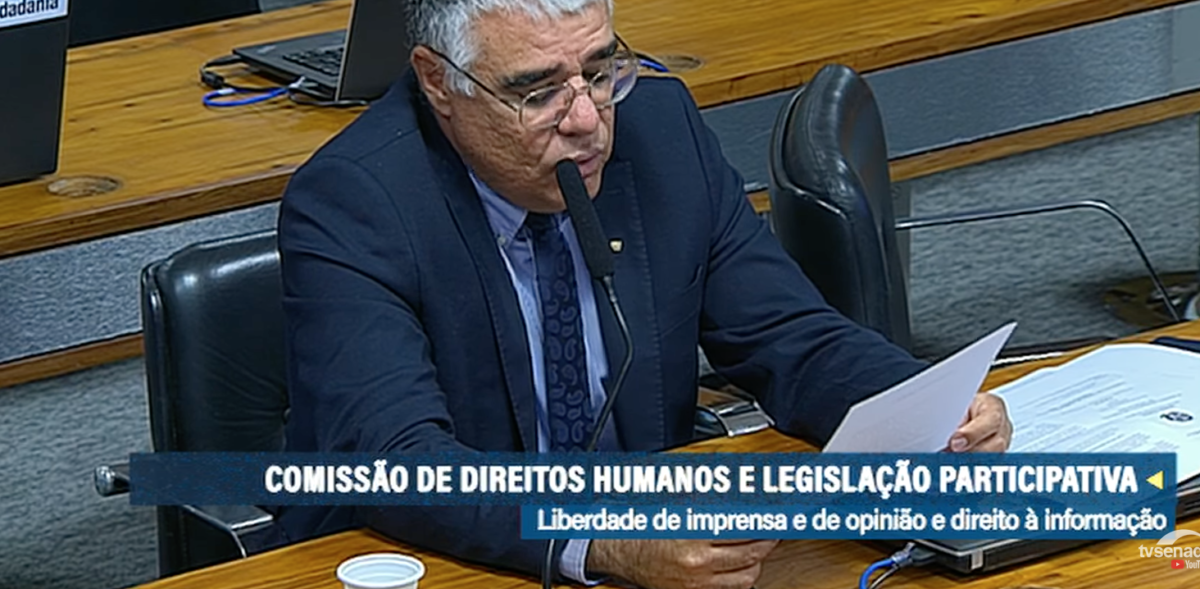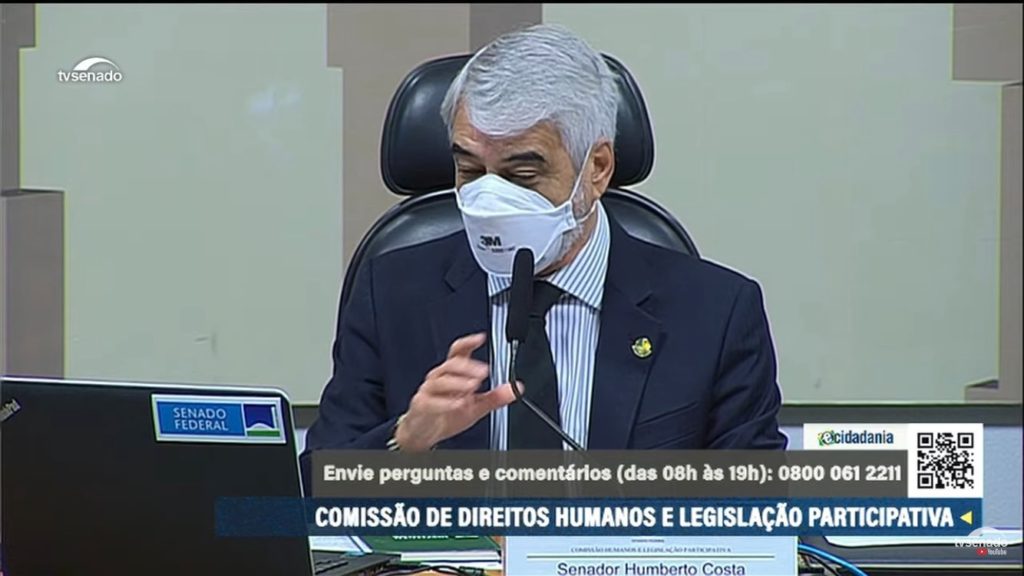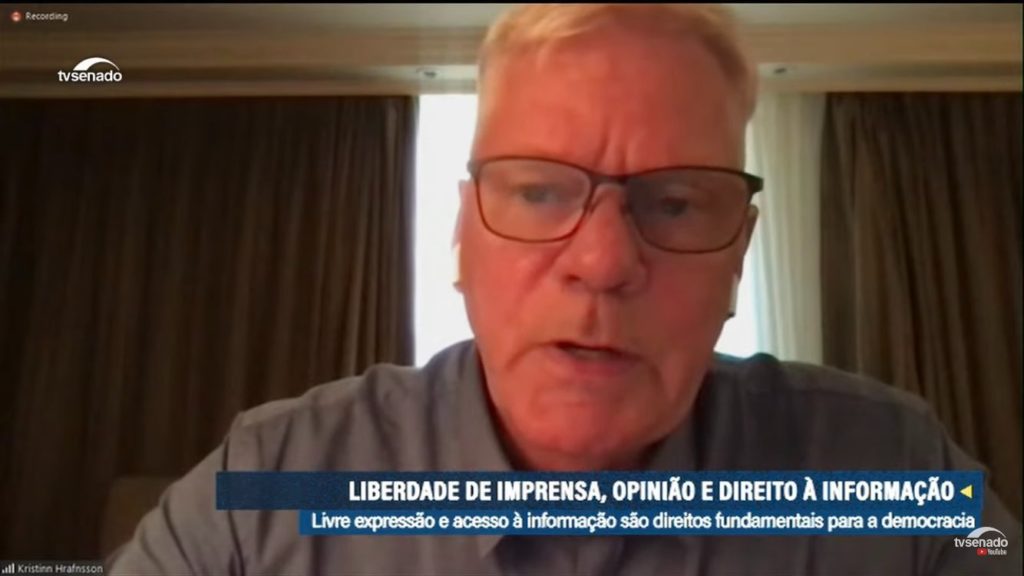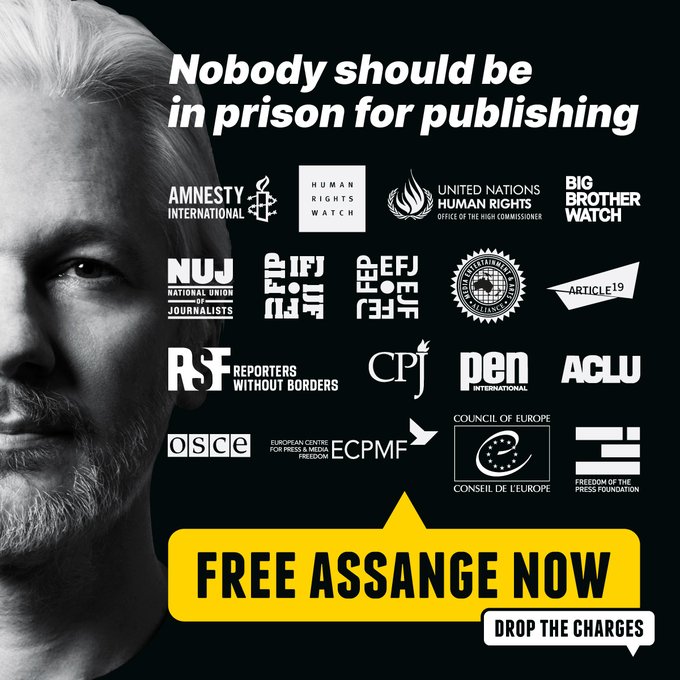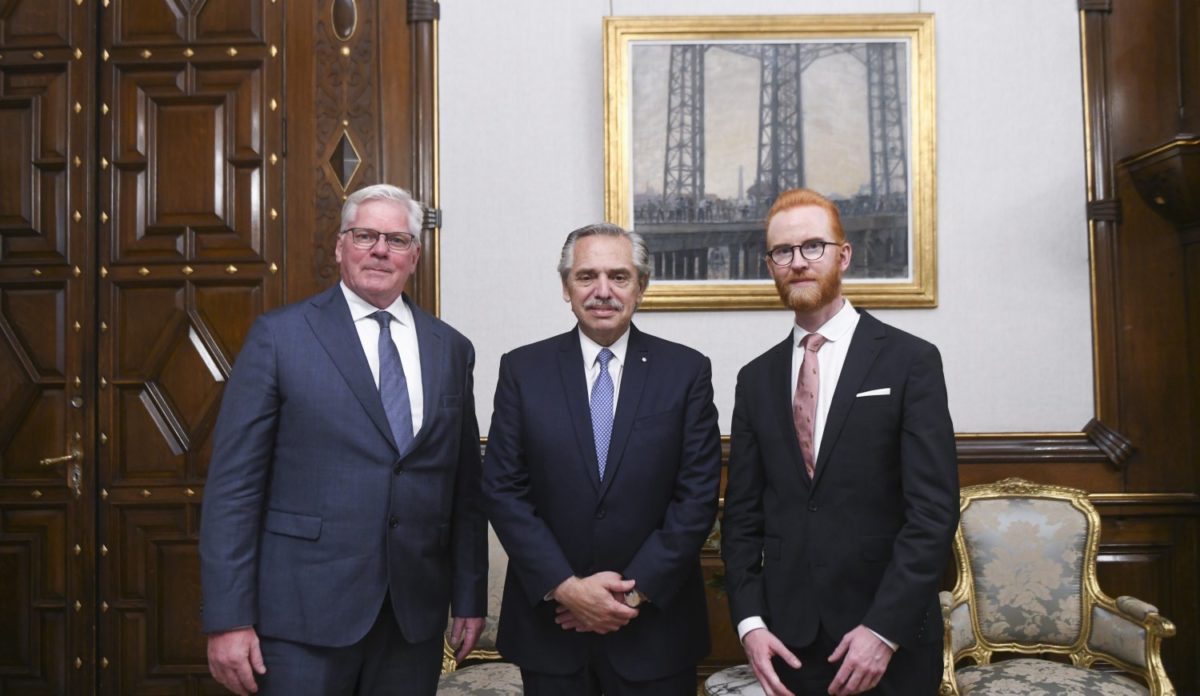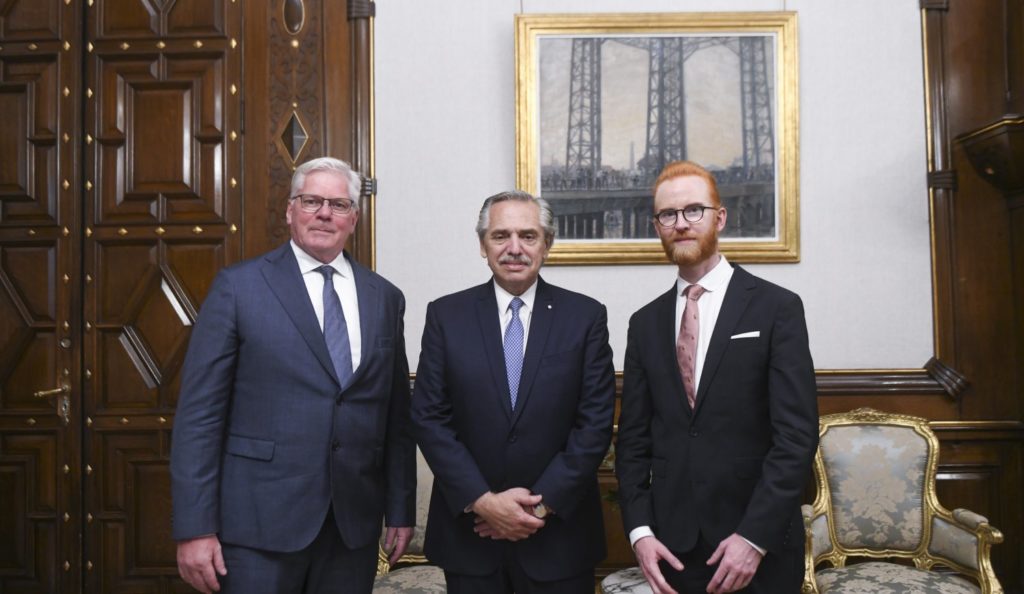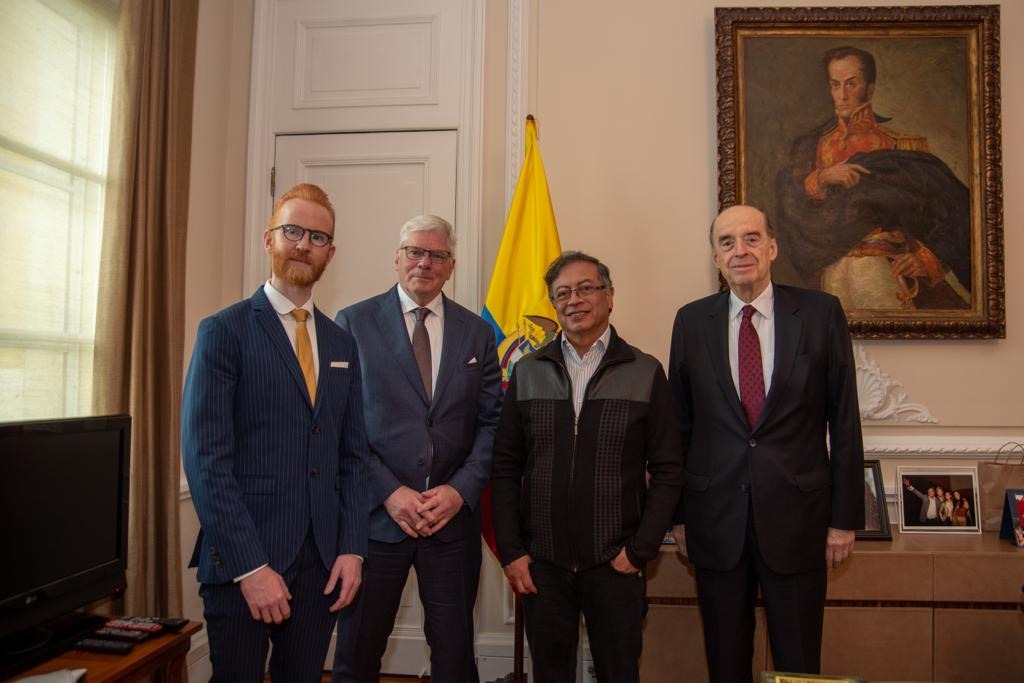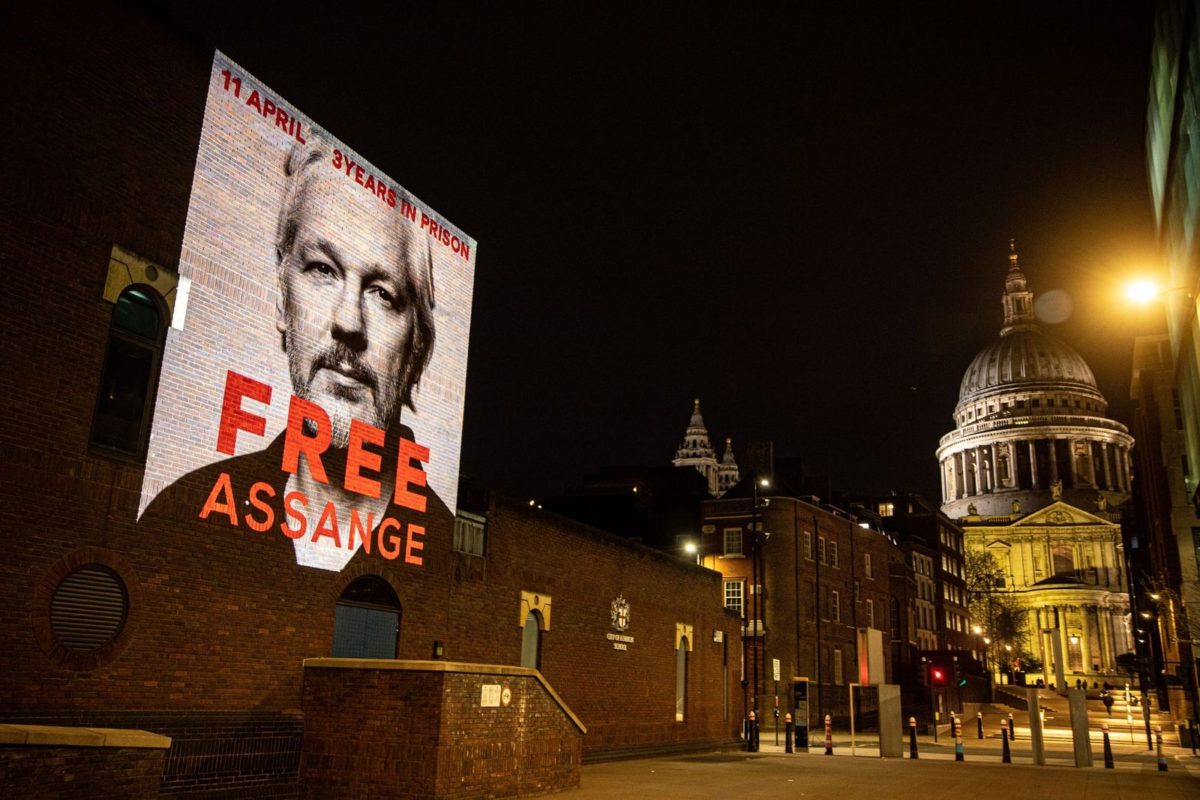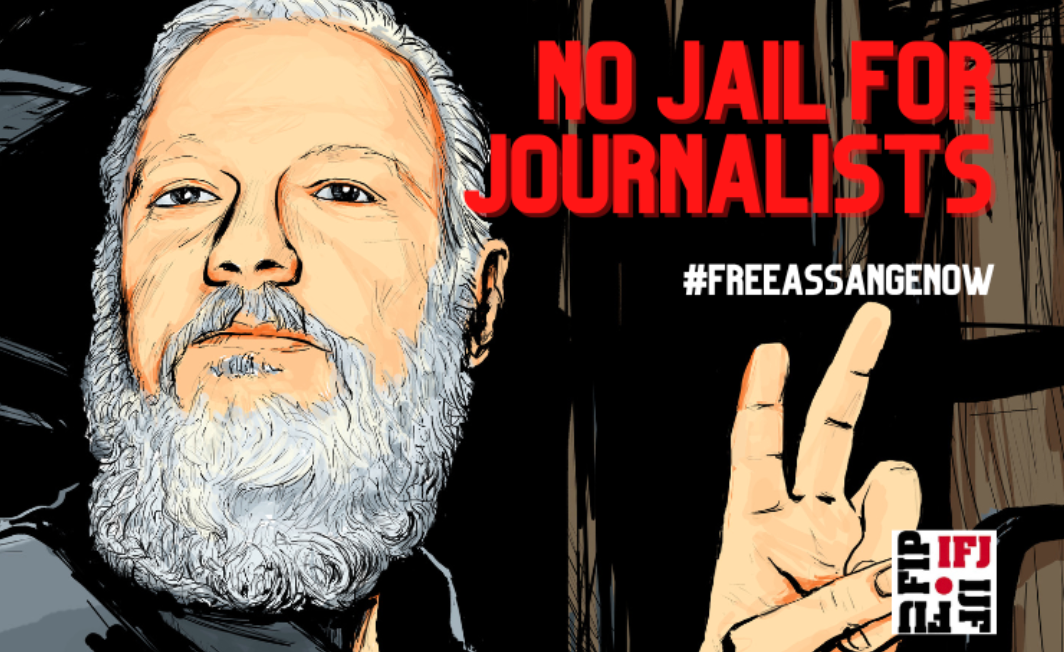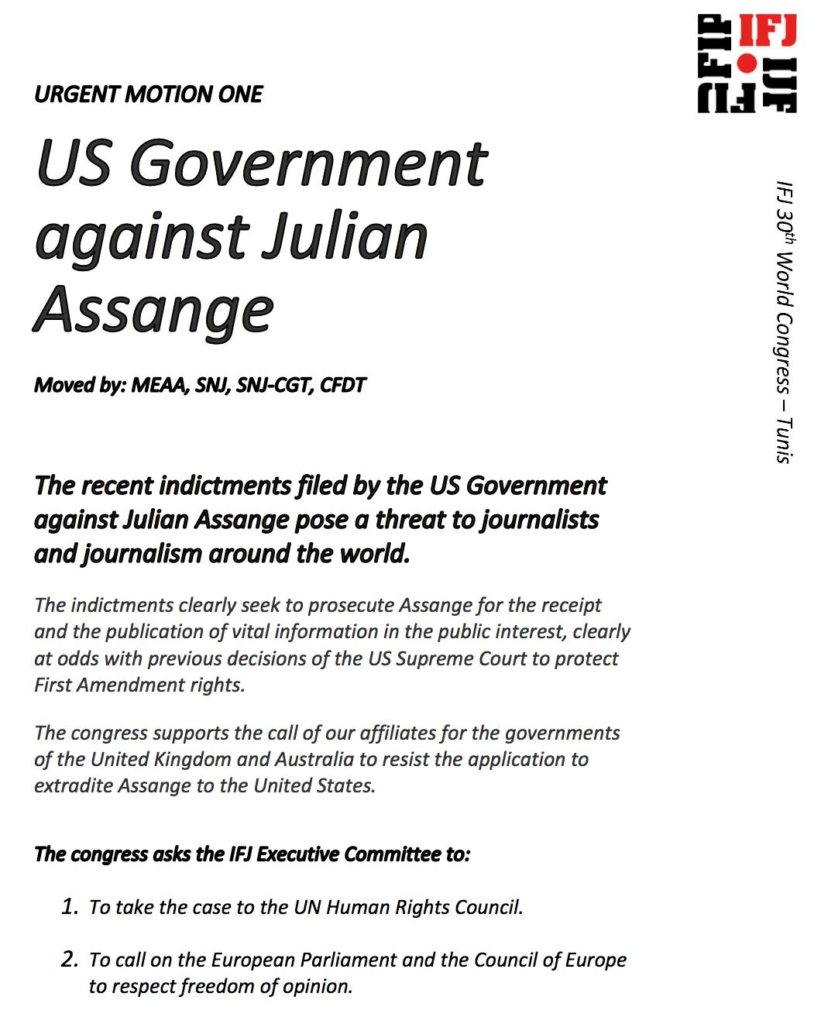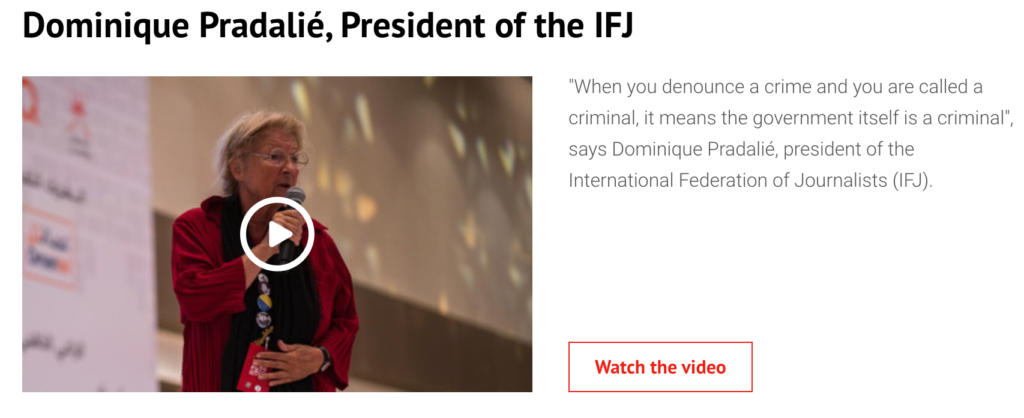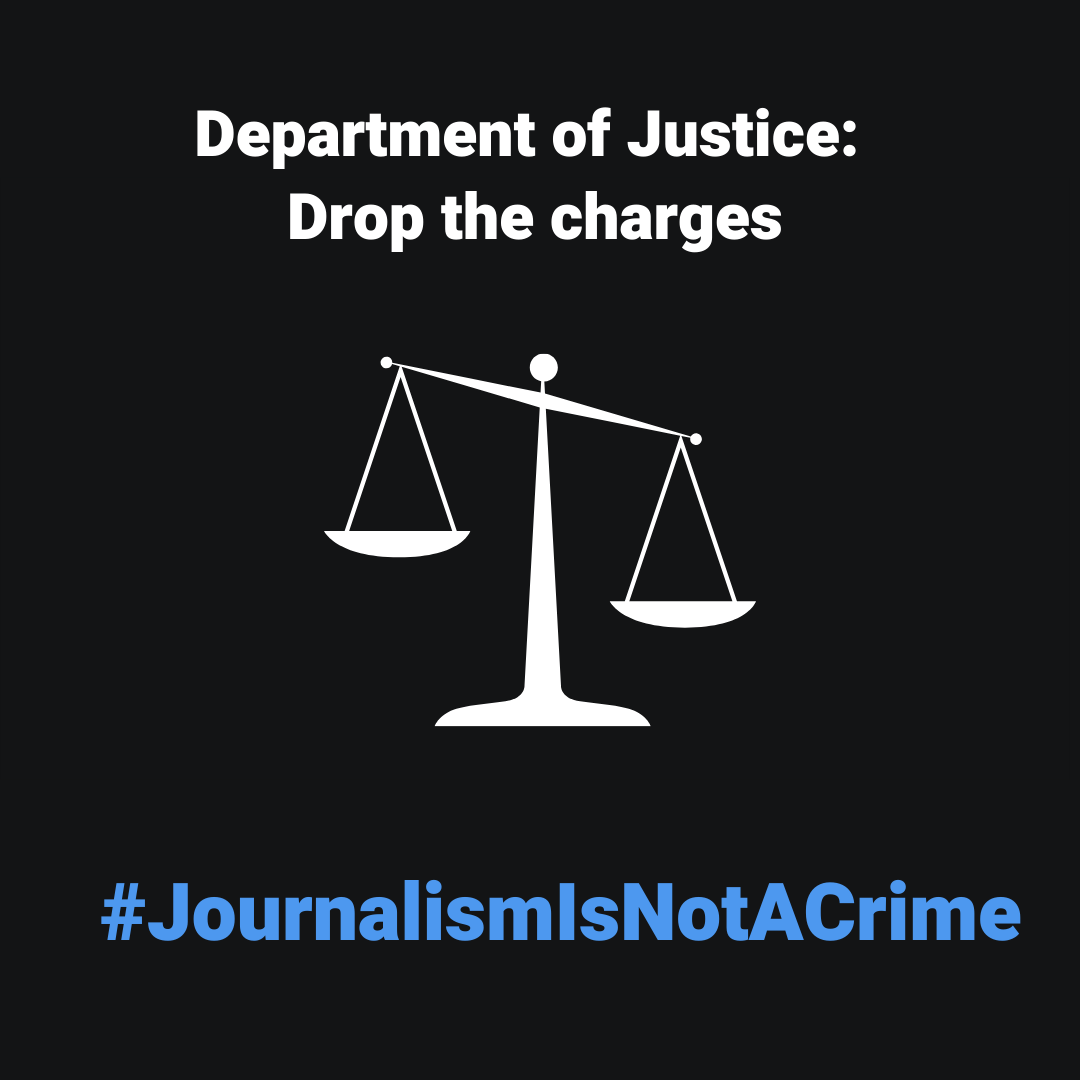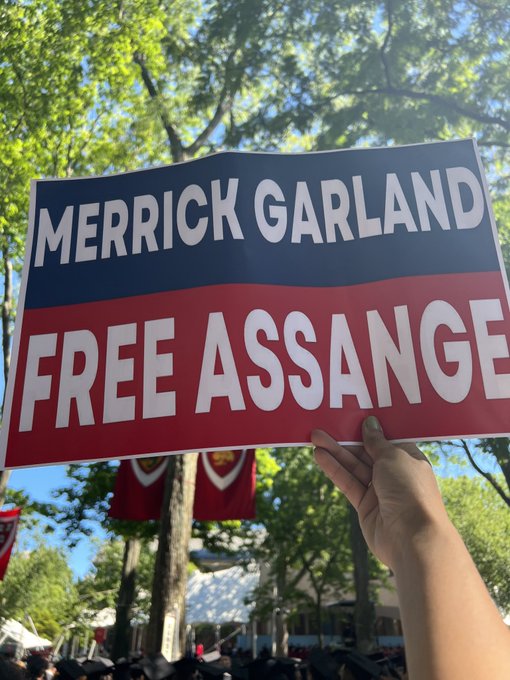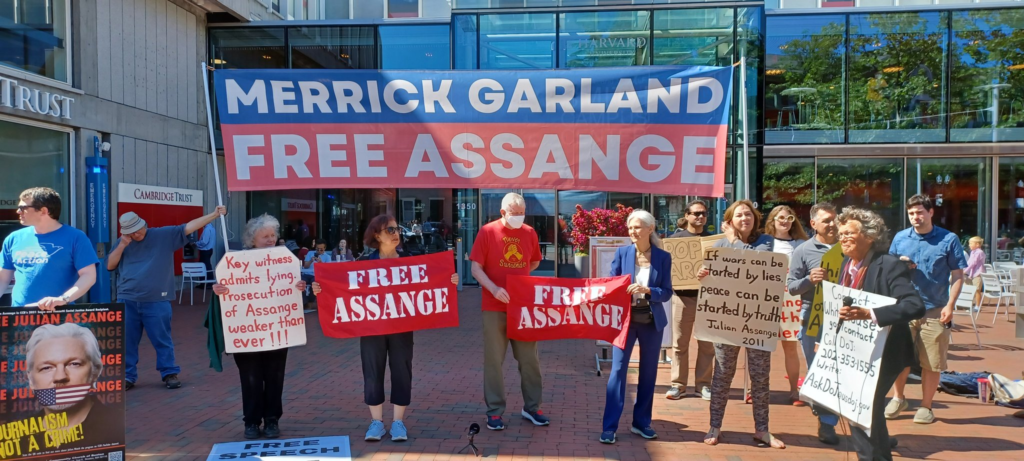U.S. letter | UK letter | Australian letter | Mexican letter
April 11, 2023 — Seven U.S. policymakers, led by Michigan Representative Rashida Tlaib, have cosigned a joint letter to U.S. Attorney General Merrick Garland, calling for the Department of Justice to drop the unprecedented charges against WikiLeaks publisher Julian Assange. Tlaib is joined by New York Reps Alexandria Ocasio-Cortez and Jamaal Bowman, Massachusetts Rep. Ayanna Pressley, Texas Rep. Greg Casar, Minnesota Rep. Ilhan Omar, and Missouri Rep. Cori Bush. The letter comes on the fourth anniversary of Assange’s arrest and imprisonment in London.
In support of the U.S. effort, parliamentarians across the political spectrum in the UK, Australia, Mexico, and Brazil have cosigned similar letters to AG Garland, emphasizing the global implications in this case.
The U.S. letter-writers note that “The prosecution of Mr. Assange marks the first time in U.S. history that a publisher of truthful information has been indicted under the Espionage Act,” and go on to warn how a conviction on these charges would change the media and political landscape of the country:
“The prosecution of Mr. Assange, if successful, not only sets a legal precedent whereby journalists or publishers can be prosecuted, but a political one as well. In the future the New York Times or Washington Post could be prosecuted when they publish important stories based on classified information. Or, just as dangerous for democracy, they may refrain from publishing such stories for fear of prosecution.”
Richard Burgon MP said:
“British Parliamentarians are increasingly alarmed by the potential extradition of Julian Assange to the United States. Any extradition would, in effect, be putting press freedom on trial. It would set a dangerous precedent for journalists and publishers around the world.
Four years on since Julian Assange was first detained in Belmarsh High-Security prison, now is the right moment to draw a line under this outrageous prosecution initiated by the Trump Administration, drop the charges against Julian Assange and allow him to return home to Australia.”
Andrew Wilkie MP, Independent Member for Clark in the Australian Federal Parliament said:
“The widespread political concern for Julian Assange is a powerful reminder that this terrible saga has gone on for much too long and must be brought to an end.
The 48 Australian federal parliamentarians who put their name to the formal letter of concern, in concert with similar letters from parliamentarians from around the world, represents millions of constituents. This is no small matter and must not be dismissed.
Nor should it be ignored that the outpouring of political concern spans the political spectrum and is based on a diverse range of reasons. This reflects how the injustice being endured by Julian Assange is so wrong on so many levels. It must be brought to an end.
The parliamentarian effort was welcomed by leaders of civil society organizations who have warned of the grave implications this case has for press freedom around the world.”
Reporters without Borders’ Rebecca Vincent said,
“As Julian Assange marks four years in Belmarsh prison and faces possible imminent extradition to the United States, it’s more crucial for Members of Congress to speak up now than ever before. No one should face prosecution or the possibility of the rest of their lives in prison for publishing information in the public interest. As long as the case against Assange continues, it will be a thorn in the side of the US government, and undermines US efforts to defend media freedom globally. We welcome Representative Tlaib’s leadership on this issue and encourage widespread support for her call on the Justice Department to drop the charges against Assange. It’s time for the US to lead by example by bringing this 12 year-old case to a close and allowing for his release without further delay.”
Freedom of the Press Foundation’s Seth Stern said,
“We commend Rep. Tlaib’s efforts to finally put an end to the unconstitutional prosecution of Julian Assange. Whatever one might think about Assange personally, there is no principled distinction between the conduct he is charged with and the kind of investigative journalism that has helped shape U.S. history. As long as the government claims the power to prosecute newsgathering, all journalists can do is hope prosecutors exercise restraint and don’t come after them for doing their jobs. Journalists will surely tread more cautiously as a result. No one who values the First Amendment should be comfortable with that which is why every major press rights and civil liberties organization opposes Assange’s prosecution.”
Julian Assange has been detained in maximum-security Belmarsh prison in London since his arrest on April 11, 2019. He is fighting extradition to the United States where he has been indicted on unprecedented charges for publishing truthful information in the public interest, for the 2010-11 publication of documents exposing war crimes and other abuses in the U.S. wars in Iraq and Afghanistan. If convicted, he faces 175 years in prison.
Chip Gibbons, Policy Director of DC-based civil liberties organization Defending Rights and Dissent, said:
Defending Rights & Dissent applauds Rep. Rashida Tlaib’s courageous defense of the First Amendment. Defending the Bill Of Rights is the responsibility of every branch of government and we are proud to stand with those members of Congress who are joining with nearly every press freedom group and newspapers such as The New York Times, in calling on the Department of Justice to end its prosecution of Julian Assange. When the Trump Administration brought unprecedented Espionage Act charges against Julian Assange for doing what journalists do everyday, they put the First Amendment in peril. To turn the page, the Biden Administration must heed the call of nearly every major human rights and press freedom group, and halt this press freedom endangering prosecution.
Nathan Fuller, Executive Director of Assange Defense, said:
We are so grateful that Rep. Rashida Tlaib has stepped up in defense of the freedom of the press and in defense of Julian Assange. The indictment against Assange is a blatant attack on the First Amendment right to publish, and it puts every investigative journalist around the world at risk.
It is heartening to see members of Congress—as well as members of parliaments across the globe—refuse to sit back and let this attack go on without a fight. Merrick Garland should leap at this opportunity to reassess the indictment, recognize the dangers it poses to democratic principles, and drop the charges at once.
U.S. letter | UK letter | Australian letter | Mexican letter
U.S. letter
Dear Attorney General Merrick Garland,
We write you today to call on you to uphold the First Amendment’s protections for the freedom of the press by dropping the criminal charges against Australian publisher Julian Assange and withdrawing the American extradition request currently pending with the British government.
Press freedom, civil liberty, and human rights groups have been emphatic that the charges against Mr. Assange pose a grave and unprecedented threat to everyday, constitutionally protected journalistic activity, and that a conviction would represent a landmark setback for the First Amendment. Major media outlets are in agreement: The New York Times, The Guardian, El Pais, Le Monde, and Der Spiegel have taken the extraordinary step of publishing a joint statement in opposition to the indictment, warning that it “sets a dangerous precedent, and threatens to undermine America’s First Amendment and the freedom of the press.”
The ACLU, Amnesty International, Reporters Without Borders, the Committee to Protect Journalists, Defending Rights and Dissent, and Human Rights Watch, among others, have written to you three times to express these concerns. In one such letter they wrote:
“The indictment of Mr. Assange threatens press freedom because much of the conduct described in the indictment is conduct that journalists engage in routinely—and that they must engage in in order to do the work the public needs them to do. Journalists at major news publications regularly speak with sources, ask for clarification or more documentation, and receive and publish documents the government considers secret. In our view, such a precedent in this case could effectively criminalize these common journalistic practices.”
The prosecution of Julian Assange for carrying out journalistic activities greatly diminishes America’s credibility as a defender of these values, undermining the United States’ moral standing on the world stage, and effectively granting cover to authoritarian governments who can (and do) point to Assange’s prosecution to reject evidence-based criticisms of their human rights records and as a precedent that justifies the criminalization of reporting on their activities. Leaders of democracies, major international bodies, and parliamentarians around the globe stand opposed to the prosecution of Assange. Former United Nations Special Rapporteur on Torture Nils Melzer and the Council of Europe’s Commissioner for Human Rights Dunja Mijatovic have both opposed the extradition. Australian Prime Minister Anthony Albanese has called on the U.S. government to end its pursuit of Assange. Leaders of nearly every major Latin American nation, including Mexican President Andrés Manuel López Obrador, Brazilian President Luiz Inácio Lula da Silva, and Argentinian President Alberto Fernández have called for the charges to be dropped. Parliamentarians from around the world, including the United Kingdom, Germany, and Australia, have all called for Assange not to be extradited to the U.S.
This global outcry against the U.S. government’s prosecution of Mr. Assange has highlighted conflicts between America’s stated values of press freedom and its pursuit of Mr. Assange. The Guardian wrote “The US has this week proclaimed itself the beacon of democracy in an increasingly authoritarian world. If Mr. Biden is serious about protecting the ability of the media to hold governments accountable, he should begin by dropping the charges brought against Mr. Assange.” Similarly, the Sydney Morning Herald editorial board stated, “At a time when US President Joe Biden has just held a summit for democracy, it seems contradictory to go to such lengths to win a case that, if it succeeds, will limit freedom of speech.”
As Attorney General, you have rightly championed freedom of the press and the rule of law in the United States and around the world. Just this past October the Justice Department under your leadership made changes to news media policy guidelines that generally prevent federal prosecutors from using subpoenas or other investigative tools against journalists who possess and publish classified information used in news gathering. We are grateful for these pro-press freedom revisions, and feel strongly that dropping the Justice Department’s indictment against Mr. Assange and halting all efforts to extradite him to the U.S. is in line with these new policies.
Julian Assange faces 17 charges under the Espionage Act and one charge for conspiracy to commit computer intrusion. The Espionage Act charges stem from Mr. Assange’s role in publishing information about the U.S. State Department, Guantanamo Bay, and wars in Iraq and Afghanistan. Much of this information was published by mainstream newspapers, such as the New York Times and Washington Post, who often worked with Mr. Assange and WikiLeaks directly in doing so. Based on the legal logic of this indictment, any of those newspapers could be prosecuted for engaging in these reporting activities. In fact, because what Mr. Assange is accused of doing is legally indistinguishable from what papers like the New York Times do, the Obama administration rightfully declined to bring these charges. The Trump Administration, which brought these charges against Assange, was notably less concerned with press freedom.
The prosecution of Mr. Assange marks the first time in U.S. history that a publisher of truthful information has been indicted under the Espionage Act. The prosecution of Mr. Assange, if successful, not only sets a legal precedent whereby journalists or publishers can be prosecuted, but a political one as well. In the future the New York Times or Washington Post could be prosecuted when they publish important stories based on classified information. Or, just as dangerous for democracy, they may refrain from publishing such stories for fear of prosecution.
Mr. Assange has been detained on remand in London for more than three years, as he awaits the outcome of extradition proceedings against him. In 2021, a U.K. District Judge ruled against extraditing Mr. Assange to the United States on the grounds that doing so would put him at undue risk of suicide. The U.K.’s High Court overturned that decision after accepting U.S. assurances regarding the prospective treatment Mr. Assange would receive in prison. Neither ruling adequately addresses the threat the charges against Mr. Assange pose to press freedom. The U.S. Department of Justice can halt these harmful proceedings at any moment by simply dropping the charges against Mr. Assange.
We appreciate your attention to this urgent issue. Every day that the prosecution of Julian Assange continues is another day that our own government needlessly undermines our own moral authority abroad and rolls back the freedom of the press under the First Amendment at home. We urge you to immediately drop these Trump-era charges against Mr. Assange and halt this dangerous prosecution.
Sincerely,
Members of Congress
CC: British Embassy; Australian Embassy
UK letter
Dear Attorney General,
We write to you as members of the UK Houses of Parliament to request that you end the extradition proceedings against Julian Assange.
This April 11th marks the fourth anniversary of Mr Assange, an award-winning journalist and publisher, being detained in His Majesty’s Prison Belmarsh in London, where he awaits a decision on extradition to the United States of America.
As you will be aware, this threat of extradition follows a decision by the Trump Administration to bring charges against Mr Assange relating to his role as a journalist and publisher in publishing evidence of war crimes, corruption and human rights abuses.
If Mr Assange were to be extradited to the United States, he faces a prison sentence of up to 175 years for his publishing work which was carried out in the United Kingdom and in partnership with globally leading news outlets.
This would clearly have a chilling impact on journalism and would set a dangerous precedent for other journalists and media organisations. It would also undermine the US’ reputation on freedom of expression and the rule of law.
Given this, there is a growing clamour for the release of Julian Assange. Anthony Albanese, the Australian Prime Minister, has urged the United States to end the prosecution of Julian Assange, who is an Australian citizen.
Likewise, extradition is opposed by the former United Nations Special Rapporteur on Torture, Nils Melzer, and the Council of Europe’s Commissioner for Human Rights, Dunja Mijatović.
Globally leading human rights organisations such as Amnesty International and Reporters Without Borders have also warned against the impact of extradition and called on the United States to drop the charges.
As we approach the fourth anniversary of the detention of Julian Assange in the HMP Belmarsh we request that you take a stance to uphold the First Amendment of the US Constitution and drop the extradition proceedings to allow Mr Assange to return home to Australia.
Yours sincerely,
MPs
Richard Burgon MP (Labour)
David Davis MP (Conservative Party)
Caroline Lucas MP (Green Party)
John McDonnell MP (Labour Party)
Angus MacNeil MP (Scottish National Party)
Liz Saville-Roberts MP (Plaid Cymru)
Jeremy Corbyn MP
Kenny MacAskill MP (Alba Party)
Diane Abbott MP (Labour Party)
Apsana Begum MP (Labour Party)
Ian Byrne MP (Labour Party)
Dan Carden MP (Labour Party)
Ben Lake MP (Plaid Cymru)
Clive Lewis MP (Labour Party)
Rachael Maskell MP (Labour Party)
Andy McDonald MP (Labour Party)
Grahame Morris MP (Labour Party)
Kate Osborne MP (Labour Party)
Bell Ribeiro-Addy MP (Labour Party)
Tommy Sheppard MP (Scottish National Party)
Zarah Sultana MP (Labour Party)
Claudia Webbe MP (Independent)
Mick Whitley MP (Labour)
LORDS
Baroness Jane Bonham-Carter (Liberal Democrat Party)
Baroness Caroline Cox (Cross-bench)
Lord Bryn Davies (Labour Party)
Lord Hugh Dykes (Liberal Democrat Party)
Lord John Hendy KC (Labour Party)
Baroness Molly Meacher (Cross-bench)
Lord Jonny Oates (Liberal Democrat Party)
Lord Diljit Rana (Conservative Party)
Lord Prem Sikka (Labour Party)
Lord Paul Strasburger (Liberal Democrat)
Lord Andrew Stunell (Liberal Democrat Party)
Lord Tony Woodley (Labour Party)
Baroness Jane Bonham-Carter (Liberal Democrat Party)
Lord Paul Strasburger (Liberal Democrat)
Australian letter
The Honourable Merrick B. Garland
Attorney General of the United States of America
US Department of Justice
950 Pennsylvania Avenue, NW
WASHINGTON DC 20530-0001
Dear Attorney General
We write to you as Australian parliamentarians from the Government, Opposition and crossbench to call on you to end the extradition proceedings against Australian citizen, Mr Julian Assange. Mr Assange is the Australian journalist and publisher, currently detained in His Majesty’s Prison Belmarsh in London awaiting a decision on extradition to the United States of America.
As you would be aware, the previous US Administration brought charges against Mr Assange for seventeen counts relating to allegedly obtaining and disclosing information under the Espionage Act of 1917, and one count under the Computer Fraud and Abuse Act of 1968. The charges pertain to Mr Assange’s actions, as a journalist and publisher for WikiLeaks, in publishing information with evidence of war crimes, corruption and human rights abuses.
If the extradition request is approved, Australians will witness the deportation of one of our citizens from one AUKUS partner to another – our closest strategic ally – with Mr Assange facing the prospect of spending the rest of his life in prison. This would set a dangerous precedent for all global citizens, journalists, publishers, media organizations and the freedom of the press. It would also be needlessly damaging for the US as a world leader on freedom of expression and the rule of law.
International experts oppose the continued persecution of Mr Assange, including the former United Nations Special Rapporteur on Torture, Nils Melzer, and the Council of Europe’s Commissioner for Human Rights, Dunja Mijatović, as well as human rights organisations, various heads of state and parliamentarians from around the world.
Attorney General, Australian public opinion on this matter is clear. Indeed polling shows that 88 per cent of Australians either support, or are unopposed, to calls for Mr Assange to be brought back to Australia. Mr Assange has been effectively incarcerated for well over a decade in one form or another, yet the person who leaked classified information had their sentence commuted and has been able to participate in American society since 2017. A clear majority of Australians consider that this matter has gone on for far too long and must be brought to a close. We implore you to drop the extradition proceedings and allow Mr Assange to return home.
Yours sincerely
Australian Parliamentarians
Signatories overleaf
2 / 3
Senator Penny Allman-Payne
Senator for Queensland
Michelle Ananda-Rajah MP
Member for Higgins
Bridget Archer MP
Member for Bass
Senator Ralph Babet
Senator for Victoria
Adam Bandt MP
Member for Melbourne
Stephen Bates MP
Member for Brisbane
Senator The Hon Matthew Canavan
Senator for Queensland
Max Chandler-Mather MP
Member for Griffith
Kate Chaney MP
Member for Curtin
Senator Dorinda Cox
Senator for Western Australia
Zoe Daniel MP
Member for Goldstein
The Hon Warren Entsch MP
Member for Leichhardt
Senator Dr Mehreen Faruqi
Senator for New South Wales
Dr Mike Freelander MP
Member for Macarthur
Dr Helen Haines MP
Member for Indi
Senator Sarah Hanson-Young
Senator for South Australia
Julian Hill MP
Member for Bruce
The Hon Barnaby Joyce MP
Member for New England
Peter Khalil MP
Member for Wills
Tania Lawrence MP
Member for Hasluck
Zaneta Mascarenhas MP
Member for Swan
Senator Nick McKim
Senator for Tasmania
Brian Mitchell MP
Member for Lyons
Llew O’Brien MP
Member for Wide Bay
Alicia Payne MP
Member for Canberra
Graham Perrett MP
Member for Moreton
Senator Barbara Pocock
Senator for South Australia
Senator David Pocock
Senator for Australian Capital Territory
Senator Gerard Rennick
Senator for Queensland
Senator Janet Rice
Senator for Victoria
Senator Malcolm Roberts
Senator for Queensland
Dr Monique Ryan MP
Member for Kooyong
Dr Sophie Scamps MP
Member for Mackellar
Rebekha Sharkie MP
3 / 3
Member for Mayo
Senator David Shoebridge
Senator for New South Wales
Allegra Spender MP
Member for Wentworth
Senator Jordon Steele-John
Senator for Western Australia
Zali Steggall OAM MP
Member for Warringah
Susan Templeman MP
Member for Macquarie
Senator Lidia Thorpe
Senator for Victoria
Kylea Tink MP
Member for North Sydney
Maria Vamvakinou MP
Member for Calwell
Senator Larissa Waters
Senator for Queensland
Elizabeth Watson-Brown MP
Member for Ryan
Senator Peter Whish-Wilson
Senator for Tasmania
Andrew Wilkie MP
Member for Clark
Josh Wilson MP
Member for Fremantle
Tony Zappia MP
Member for Makin
Mexican letter
(En español)
President Joseph Biden
Speaker of the House Kevin McCarthy
The White House
1600 Pennsylvania Avenue, N.W.
Washington, DC 20500
Dear Mr President of the United States of America,
Dear Speaker of the House,
We write to you as Members of the Mexican parliament to express our collective concerns about the US request to extradite the journalist and publisher, Julian Paul Assange, from the UK to the US, and the chilling precedent that extradition would set for other journalists and publishers around the world.
The political nature of the offense prohibits extradition
The US superseding indictment issued against Mr Assange on 24 June 2020 charges him with 18 counts all related solely to the 2010 publications of US government documents. Charges 1-17 are brought under the Espionage Act 1917, even though espionage is widely recognized as a political offense under international law. The UK-US Extradition Treaty that forms the basis of the extradition request specifically prohibits extradition for political offenses. So, too, does the 1957 European Convention on Extradition, the European Convention on Human Rights, the UN Model Treaty on Extradition, the Interpol Constitution, and other bilateral treaties ratified by the US. This principle is also enshrined in the Inter-American Human Rights System, which also upholds the right to political asylum.
Mr Assange undertook standard investigative journalistic practices, which include receiving classified information from a source inside the government and then publishing that information in the public interest. The charges under the Espionage Act would criminalize these routine practices, which are protected by the First Amendment to the United States Constitution. It was in recognition of the irreconcilable conflict between these charges and the First Amendment that the Obama Administration rightly refused to charge Mr Assange with espionage because it would criminalize the standard journalistic practice.
Risk of being subjected to an unfair trial in the US
Mr Assange’s legal privilege, a right enshrined in Art. 8 European Convention on Human Rights (ECHR) and long recognized under English common law, was grossly violated through constant and criminal video and audio surveillance at the Ecuadorian embassy carried out by the Spanish security firm, UC Global. This surveillance was, according to witness testimony, ordered by the CIA and has triggered an investigation into the owner of UC Global, David Morales, by Spain’s High Court, the Audiencia Nacional. The surveillance resulted in all of Mr Assange’s meetings and conversations being recorded, including those with his lawyers. The Council of Bar and Law Societies of Europe, which represents more than a million European lawyers, has expressed its concerns that these illegal recordings may be used – openly or secretly – in proceedings against Mr Assange in the event of successful extradition to the US. The Council states that if the information merely became known to the prosecutors, this would present an irremediable breach of Mr Assange’s fundamental rights to a fair trial under Art. 6 of the ECHR and due process under the US Constitution. The UN Model Treaty on Extradition prohibits extradition if the person has not received, or would not receive, the minimum guarantees in criminal proceedings, as enshrined in Art. 14 of the International Covenant on Civil and Political Rights (ICCPR).
Judicial Conflicts of Interest
Senior District Judge (Magistrates’ Courts) Emma Arbuthnot, who as Chief Magistrate oversees Mr Assange’s extradition proceedings, has been shown to have financial links to institutions and individuals whose wrongdoings have been exposed by WikiLeaks, the organization which Mr Assange founded. This seemingly clear conflict of interest was, however, not disclosed by the District Judge. District Judge Arbuthnot did not recuse herself and was permitted to make rulings to Mr Assange’s detriment, despite the perceived lack of judicial impartiality and independence.
Mr Assange was arrested on 11 April 2019 and is now one of the longest-serving prisoners on remand in the United Kingdom.
We respectfully call on your Administration and American Congress to renew trust in the rule of international law, and the rule of law in the United States, by dropping the charges against Mr Assange and bringing an end to the ongoing extradition proceedings.
We add ours to an ever-growing public voice across civil society, human rights organizations, press groups, and the political and judicial class proclaiming that Mr Assange’s persecution must be halted. We fully agree with the Council of Europe, which considers Mr Assange’s treatment to be among “the most severe threats to media freedom,” and with the EU Parliament and parliamentarians worldwide, who oppose the extradition and express concerns about the violations of Mr Assange’s fundamental human, civil, and political rights.
We join in the call for Mr Assange’s immediate release made by international organizations at the United Nations, Amnesty International, other human rights advocates, and legal, medical and other professional associations.
We urge the U.S. Justice Department to drop all charges against Mr Assange.
With all our best regards and wishes for mutual cooperation,
En español
Presidente Joseph Biden
Presidente de la Cámara de Representantes, Kevin McCarthy
La Casa Blanca,
1600 Pennsylvania Avenue, N.W.
Washington, DC 20500
Estimado presidente de la Cámara,
Les escribimos como miembros del Senado y de la Cámara de Legisladores de México para expresar nuestras preocupaciones colectivas sobre la solicitud de EE. UU. de extraditar al periodista y editor, Julian Paul Assange, del Reino Unido, a EE. UU. y el
escalofriante precedente que establecería la extradición para otros periodistas y editores de todo el mundo.
La naturaleza política del delito prohíbe la extradición
La acusación sustitutiva emitida por Estados Unidos contra el Sr. Assange el 24 de junio de 2020 contempla 18 cargos, todos relacionados únicamente con las publicaciones de documentos del gobierno de EE. UU. hechas en 2010. Los cargos 1 a 17 se presentan en virtud de la Ley de espionaje de 1917, aunque el espionaje está ampliamente reconocido como un delito político según el derecho internacional. El Tratado de Extradición Reino Unido-Estados Unidos que constituye la base de la solicitud de extradición prohíbe específicamente la extradición por delitos políticos. Lo mismo ocurre con el Convenio Europeo de Extradición de 1957, el Convenio Europeo de Derechos Humanos, el Tratado Modelo de Extradición de la ONU, la Constitución de Interpol y otros tratados bilaterales ratificados por EE.UU. Este principio también está consagrado en el Sistema Interamericano de Derechos Humanos, que también defiende el derecho al asilo político.
Assange llevó a cabo prácticas periodísticas de investigación estándar, que incluyen recibir información clasificada de una fuente dentro del gobierno y luego publicar esa información en interés público. Los cargos bajo la Ley de Espionaje criminalizarían estas prácticas rutinarias que están protegidas por la Primera Enmienda de la Constitución de los Estados Unidos. Fue en reconocimiento del conflicto irreconciliable entre estos cargos y la Primera Enmienda que la Administración Obama se negó acertadamente a acusar a Assange de espionaje porque criminalizaría la práctica periodística estándar.
Riesgo de ser sometido a un juicio injusto en EE. UU.
El privilegio legal del señor Assange, un derecho consagrado en el art. 8 Convenio Europeo de Derechos Humanos (CEDH) y reconocido desde hace mucho tiempo por el derecho consuetudinario inglés, fue violado gravemente a través de la vigilancia constante y criminal de video y audio en la Embajada ecuatoriana, misma que fue llevada a cabo por la empresa de seguridad española, UC Global. Esta vigilancia fue, según el testimonio de un testigo, ordenada por la CIA, desencadenando una investigación sobre el propietario de UC Global, David Morales, por parte del Tribunal Superior de Justicia de España, la Audiencia Nacional. La vigilancia resultó en la grabación de todas las reuniones y conversaciones de Assange, incluidas aquellas con sus abogados. El Consejo de Colegios de Abogados y Abogados de Europa, que representa a más de un millón de abogados europeos, ha expresado su preocupación
de que estas grabaciones ilegales puedan usarse, abierta o secretamente, en procedimientos contra el Sr. Assange en caso de una extradición exitosa a los EE. UU. El Consejo afirma que, si la información simplemente llegara a ser conocida por los
fiscales, esto representaría una violación irremediable de los derechos fundamentales del Sr. Assange a un juicio justo en virtud del art. 6 de la CEDH y el debido proceso bajo la Constitución de los Estados Unidos. El Tratado Modelo de Extradición de la ONU prohíbe la extradición si la persona no ha recibido, o no recibiría, las garantías mínimas en los procesos penales, tal como lo establece el art. 14 del Pacto Internacional de Derechos Civiles y Políticos (PIDCP).
Conflictos de intereses judiciales
Se ha demostrado que la jueza principal de distrito (tribunales de magistrados) Emma Arbuthnot, quien como magistrada principal supervisa los procedimientos de extradición del Sr. Assange, tiene vínculos financieros con instituciones y personas cuyas fechorías han sido expuestas por WikiLeaks, la organización que fundó el Sr. Assange. Sin embargo, este aparentemente claro conflicto de intereses no fue revelado por el juez de
distrito. La jueza de distrito Arbuthnot no se recusó y se le permitió dictar sentencias en detrimento de Assange, a pesar de la aparente falta de imparcialidad e independencia judicial.
Assange fue arrestado el 11 de abril de 2019 y ahora es uno de los presos con más años en prisión preventiva en el Reino Unido.
Hacemos un llamado respetuosamente a su administración y al Congreso estadounidense para que renueven la confianza en el Estado de derecho internacional y el Estado de derecho en los Estados Unidos, retirando los cargos contra el Sr. Assange y poniendo fin a los procedimientos de extradición en curso.
A una voz pública cada vez mayor en la sociedad civil, las organizaciones de derechos humanos, los grupos de prensa y la clase política y judicial que proclaman que se debe detener la persecución del Sr. Assange, agregamos la nuestra. Estamos totalmente de acuerdo con el Consejo de Europa, que considera que el trato al Sr. Assange se encuentra entre “las amenazas más graves a la libertad de prensa”, y con el Parlamento de la Unión Europa y los parlamentarios de todo el mundo, que se oponen a la extradición y expresan su preocupación por las violaciones de los principios fundamentales del Sr. Assange. derechos humanos, civiles y políticos.
Nos unimos al llamado para la liberación inmediata del Sr. Assange hecho por organizaciones internacionales en las Naciones Unidas, Amnistía Internacional, otros defensores de los derechos humanos y asociaciones legales, médicas y otras
asociaciones profesionales.
Instamos al Departamento de Justicia de EE. UU. a que retire todos los cargos contra Assange.
Con todos nuestros mejores saludos y deseos de cooperación mutua,
Minerva Citlalli Hernández Mora
Senadora por la Ciudad de México
Freyda Marybel Villegas Canché
Senadora por Quintana Roo
Cecilia Margarita
Sánchez García
Senadora por Campeche
Jesús Lucía Trasviña Waldenrath
Senadora por Baja California Sur
Navor Alberto Rojas Mancera
Senador por Hidalgo
Olga María del Carmen Sánchez
Cordero
Senadora
Reyes Flores Hurtado
Senador por Coahuila
Imelda Castro Castro
Senadora por Sinaloa
Sasil de León Villard
Senadora por Chiapas
Oscar Eduardo Ramírez Aguilar
Senador por Chiapas
Sergio Pérez Flores
Senador por Morelos
María Antonieta Cárdenas Mariscal
Senadora por Jalisco
Lilia Margarita Valdez Martínez
Senadora por Durango
Héctor Vasconcelos
Senador
Higinio Martínez Miranda
Senador por el Estado de México
Griselda Valencia de la Mora
Senadora por Colima
Antares Guadalupe Vázquez
Alatorre
Senadora
César Arnulfo Cravioto
Romero
Senador por la Ciudad de México
Katya Elizabeth Ávila Vázquez
Senadora
Mónica Fernández Balboa
Senadora por Tabasco
Verónica Noemí Camino Farjat
Senadora por Yucatán
Marcela Mora
Senadora
Lucía Meza
Senadora por Morelos
Gilberto Herrera Ruiz
Senador por Querétaro
Raúl Paz Alonso
Senador por Yucatán
Gloria Sánchez Hernández
Senadora por Veracruz
Eunice Renata Romo Molina
Senadora
Nestora Salgado García
Senadora por Guerrero
José Narro Céspedes
Senador por Zacatecas
Ricardo Velázquez Meza
Senador por Baja California Sur
Cristóbal Arias Solis
Senador por Michoacán
Martha Lucía Micher Camarena
Senadora por Guanajuato
José Ramón Enríquez Herrera
Senador por Durango
Ovidio Salvador Peralta Suárez
Senador por Tabasco
Ma. Guadalupe Covarrubias
Senadora por Tamaulipas
Ana Lilia Rivera Rivera
Senadora por Tlaxcala
Alejandro Armenta Mier
Senador por Puebla
Casimiro Méndez Ortiz
Senador
Raúl de Jesus Elenes Angulo
Senador por Sinaloa
Maria Soledad Luévano Cantú
Senadora por Zacatecas
Arturo del Carmen Moo Cahuich
Senador por Campeche
Napoleón Gómez Urrutia
Senador
María Merced González González
Senadora por Hidalgo
Daniel Gutiérrez Castorena
Senador por Aguascalientes
Adolfo Gómez Hernández
Senador por Oaxaca
Manuel Vázquez Arellano
Diputado Federal
Jorge Alberto Barrera Toledo
Diputado Federal
Aleida Alavez Ruiz
Diputada Federal
Andrea Chávez Treviño
Diputada Federal
Mario Alberto Torres
Diputado Federal
Leticia Chavez
Diputada Federal
Hamlet García Almaguer
Diputado Federal
Susana Prieto Terrazas
Diputada Federal
Maximiano Barboza Llamas
Diputado Federal
José Luis Flores Pacheco
Diputado Federal
Yeidckol Polevnsky
Diputada Federal
María Guadalupe Chavira de la Rosa
Diputada Federal
Javier Huerta Jurado
Diputado Federal
Alma Delia Navarrete Rivera
Diputada Federal
Karla Estrella Díaz García
Diputada Federal
Olimpia Tamara Girón
Diputada Federal
Juan Guadalupe Torres Navarro
Diputado Federal
Erika Vanessa del Castillo Ibarra
Diputada Federal
José Guadalupe Ambrocio Gachuz
Diputado Federal
Graciela Sánchez Ortiz
Diputado Federal
María Clemente García Moreno
Diputada Federal
Jaime Humberto Pérez Bernabé
Diputado Federal
Ángel Miguel Rodríguez Torres
Diputado Federal
Alejandro Robles
Diputado Federal
Arturo Hernández Tapia
Diputado Federal
Raymundo Atanacio Luna
Diputado Federal
Steve del Razo Montiel
Diputado Federal
Armando Corona Arvizu
Diputado Federal
Ana Elizabeth Ayala Leyva
Diputada Federal
Martín Sandoval Soto
Diputado Federal
Otoniel García Montiel
Diputado Federal
Leticia Estrada Hernández
Diputada Local de la Ciudad de
México
Cirse Camacho
Diputada local de la Ciudad de México
Martha Soledad Avila Ventura
Diputada local de la Ciudad de México
Miriam Valeria Cruz Flores
Diputada local de la Ciudad de México
Ana Francis López Bayghen Patiño
Diputada local de la Ciudad de México
Héctor Díaz Polanco
Diputado local de la Ciudad de México
Marcela Fuente Castillo
Diputada local de la Ciudad de México
Nancy Marlene Núñez Reséndiz
Diputada local de la Ciudad de México
Xóchitl Bravo Espinosa
Diputada local de la Ciudad de México
José Martin Padilla Sánchez
Diputado local por la Ciudad de México
Miguel Ángel Macedo Escartín
Diputado local de la Ciudad de México
Yuriri Ayala Zúñiga
Diputada local de la Ciudad de México
Alejandra Méndez Vicuña
Diputada local de la Ciudad de México
José Fernando Mercado Guaida
Diputado local de la Ciudad de
México
Valentina Valia Batres Guadarrama
Diputada local de la Ciudad de
México
Christian Moctezuma González
Diputado local de la Ciudad de
México
Nazario Norberto Sánchez
Diputado local de la Ciudad de
México
María Guadalupe Chávez Contreras
Diputada local de la Ciudad de
México
Esperanza Villalobos Pérez
Diputada local de la Ciudad de
México
Marisela Zúñiga Cerón
Diputada local de la Ciudad de
México
Carlos Hernández Mirón
Diputado local de la Ciudad de
México

